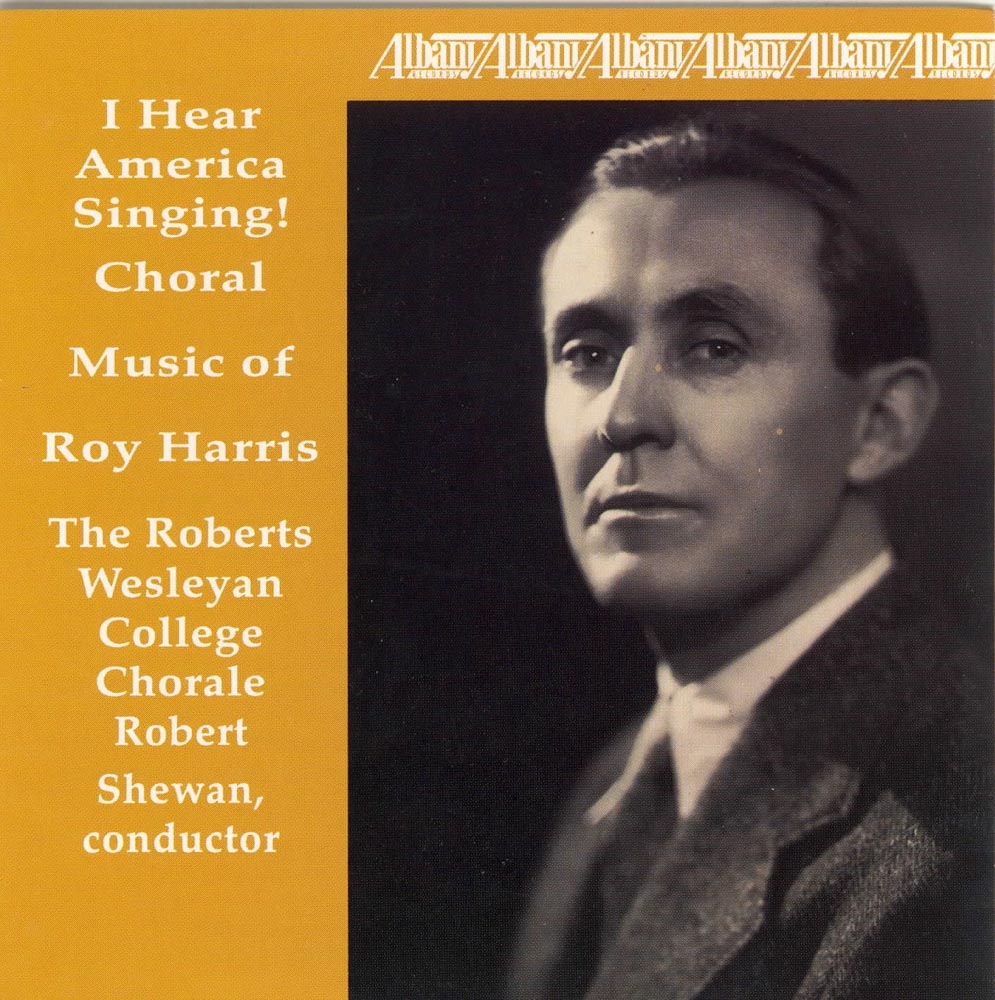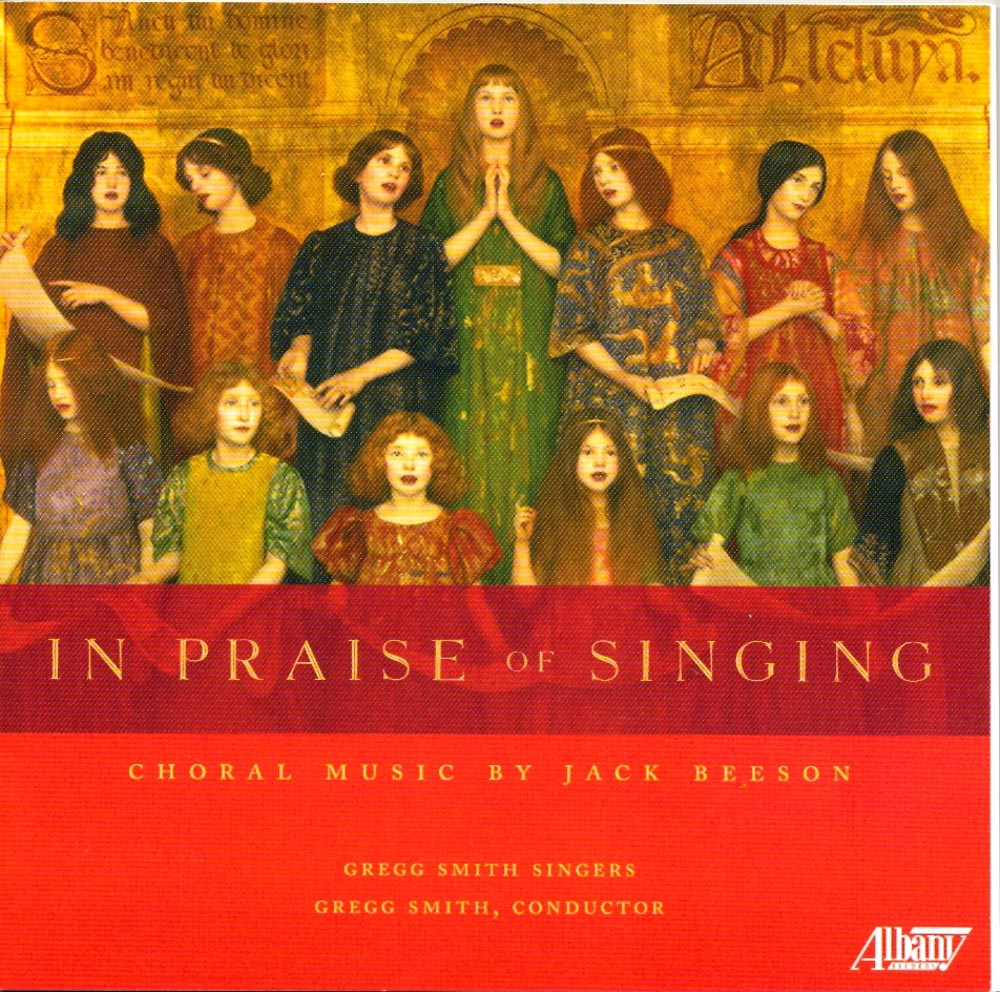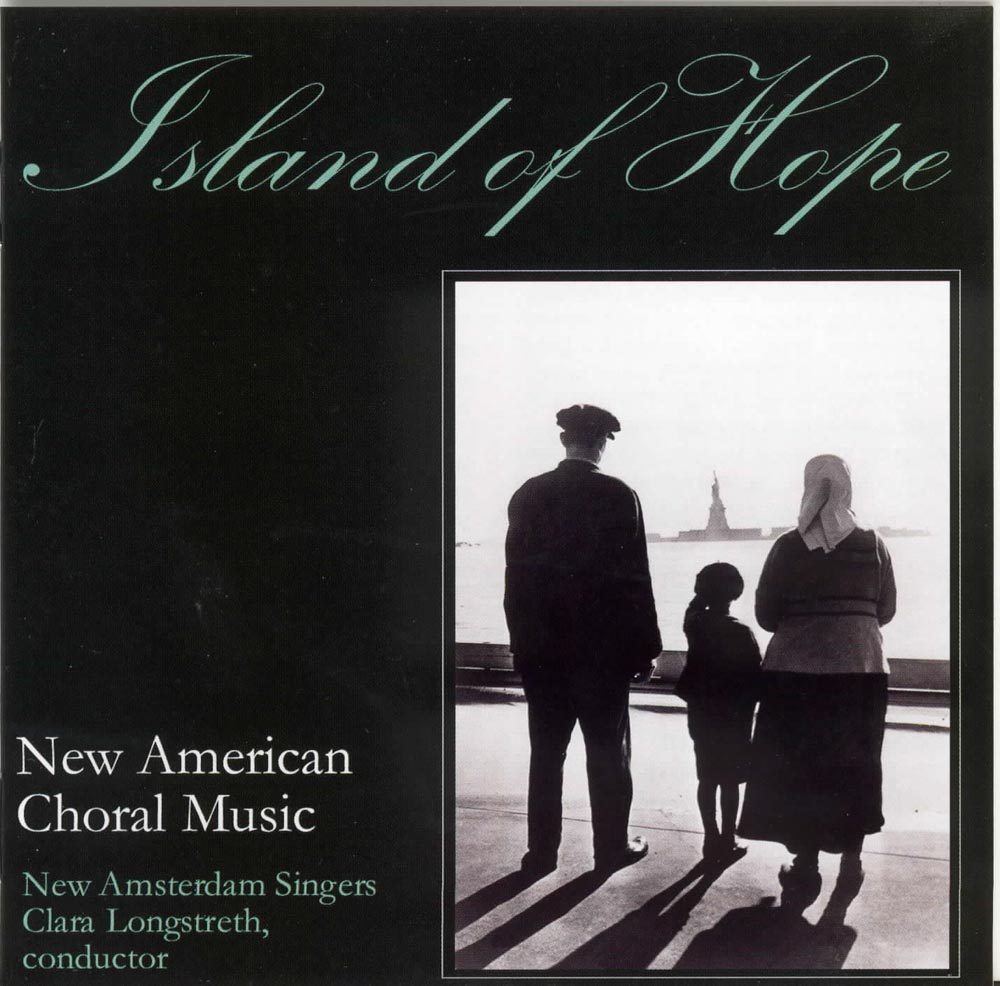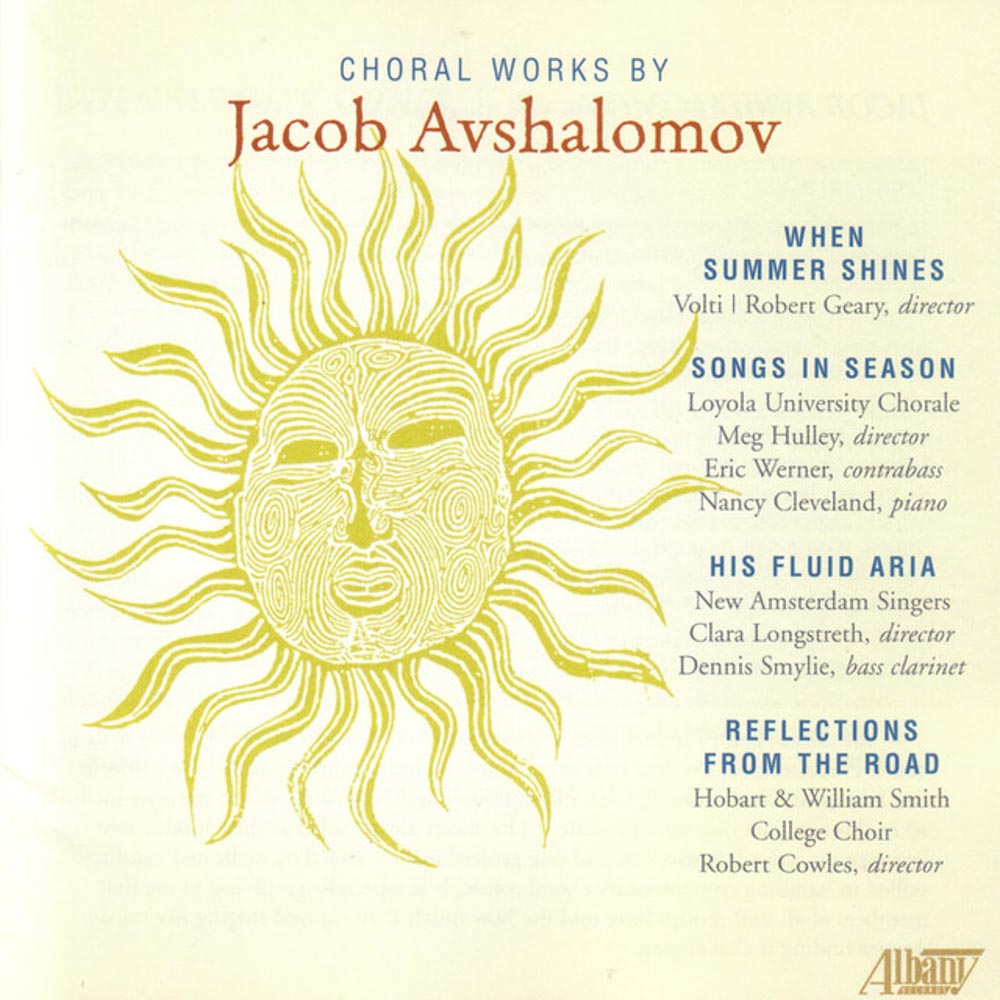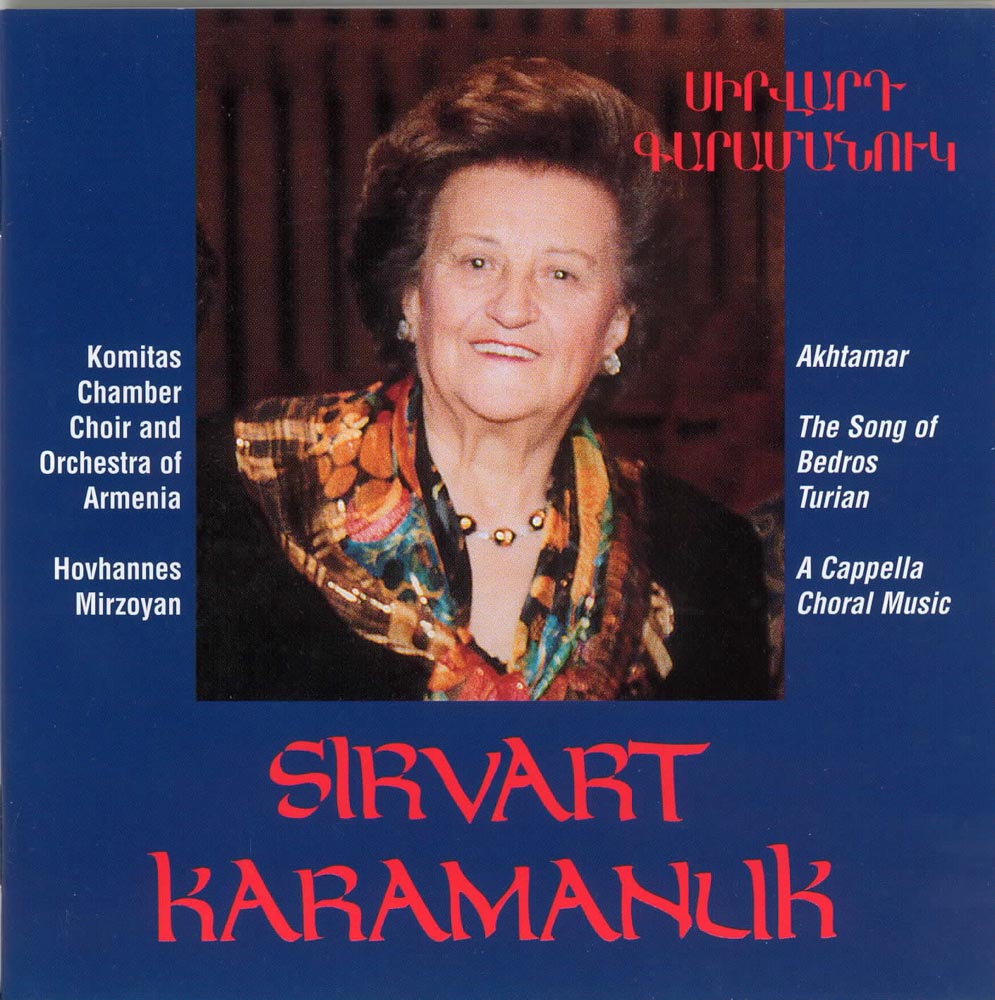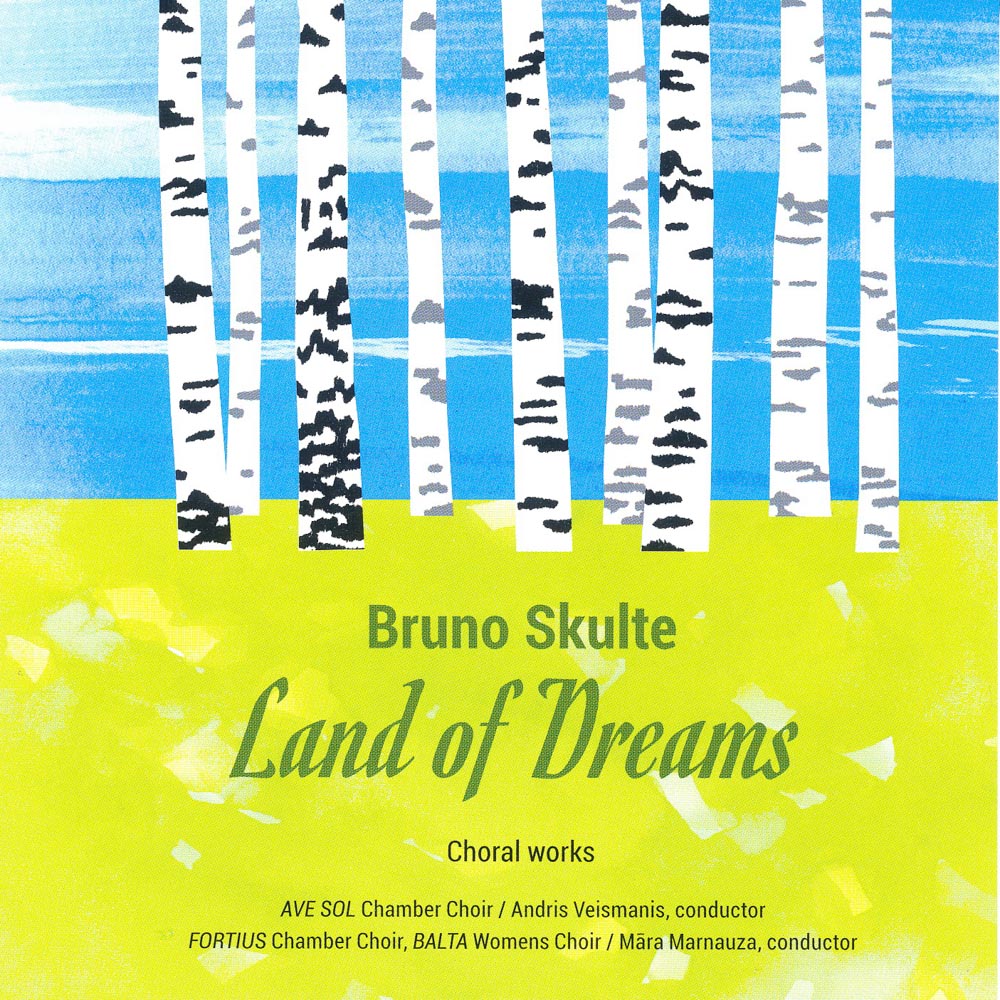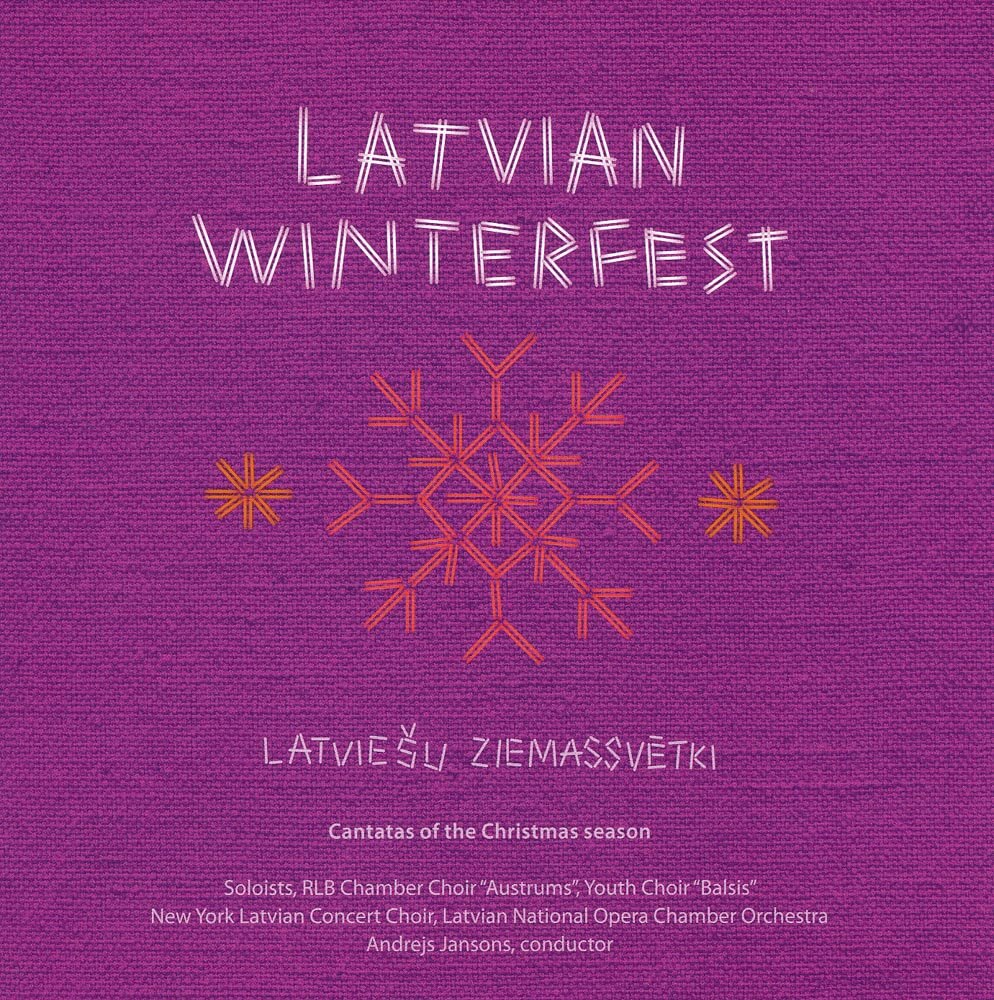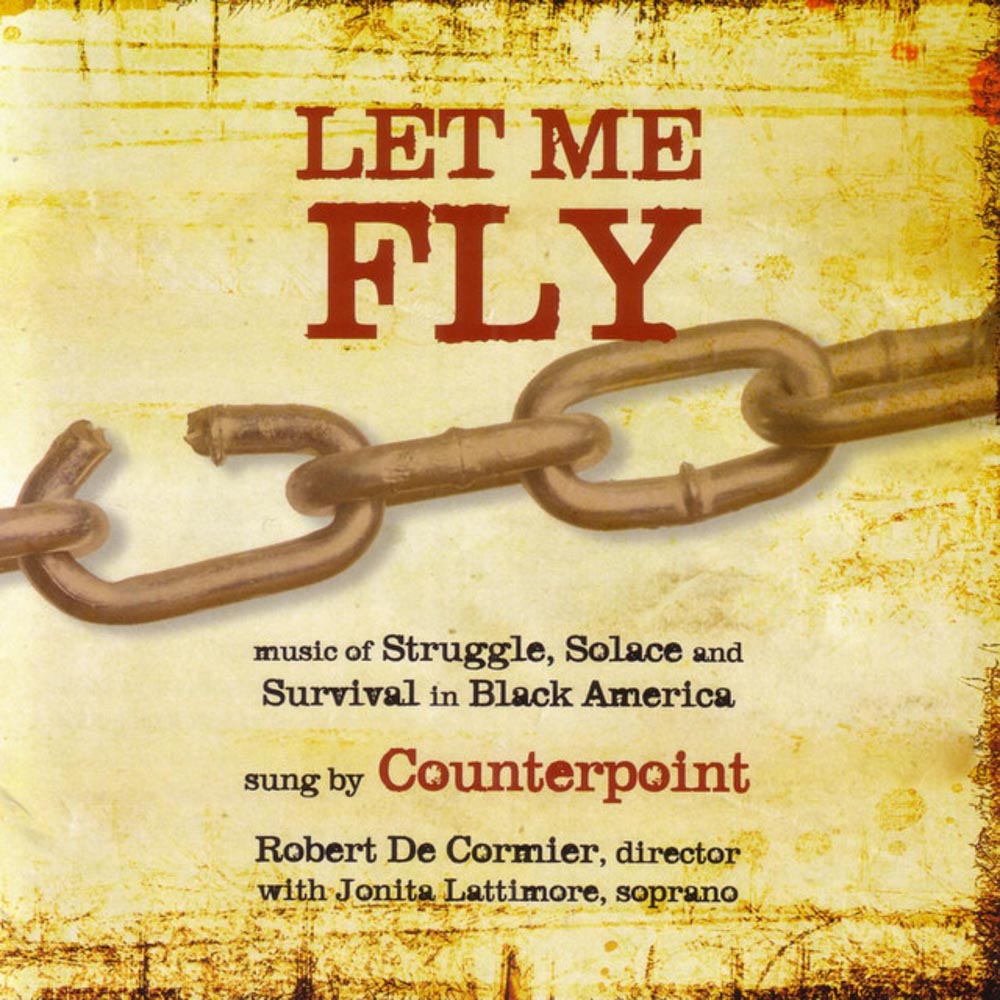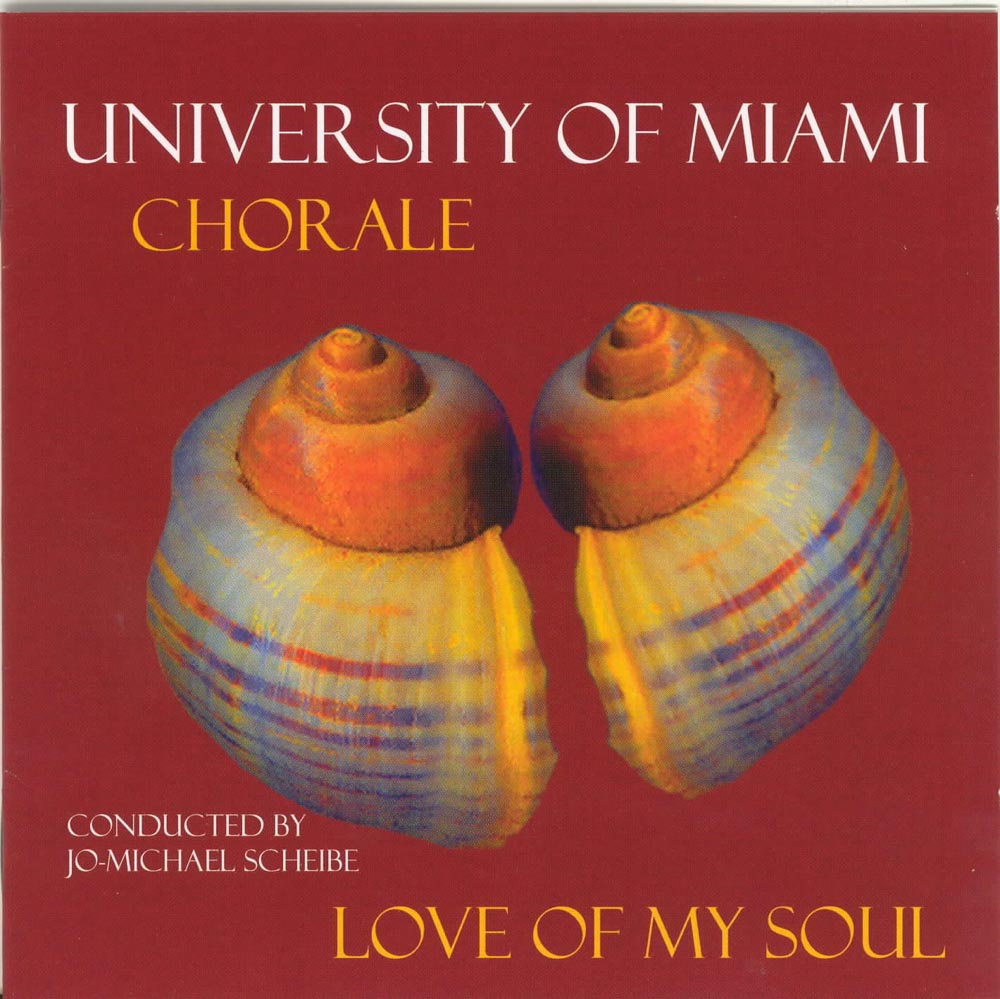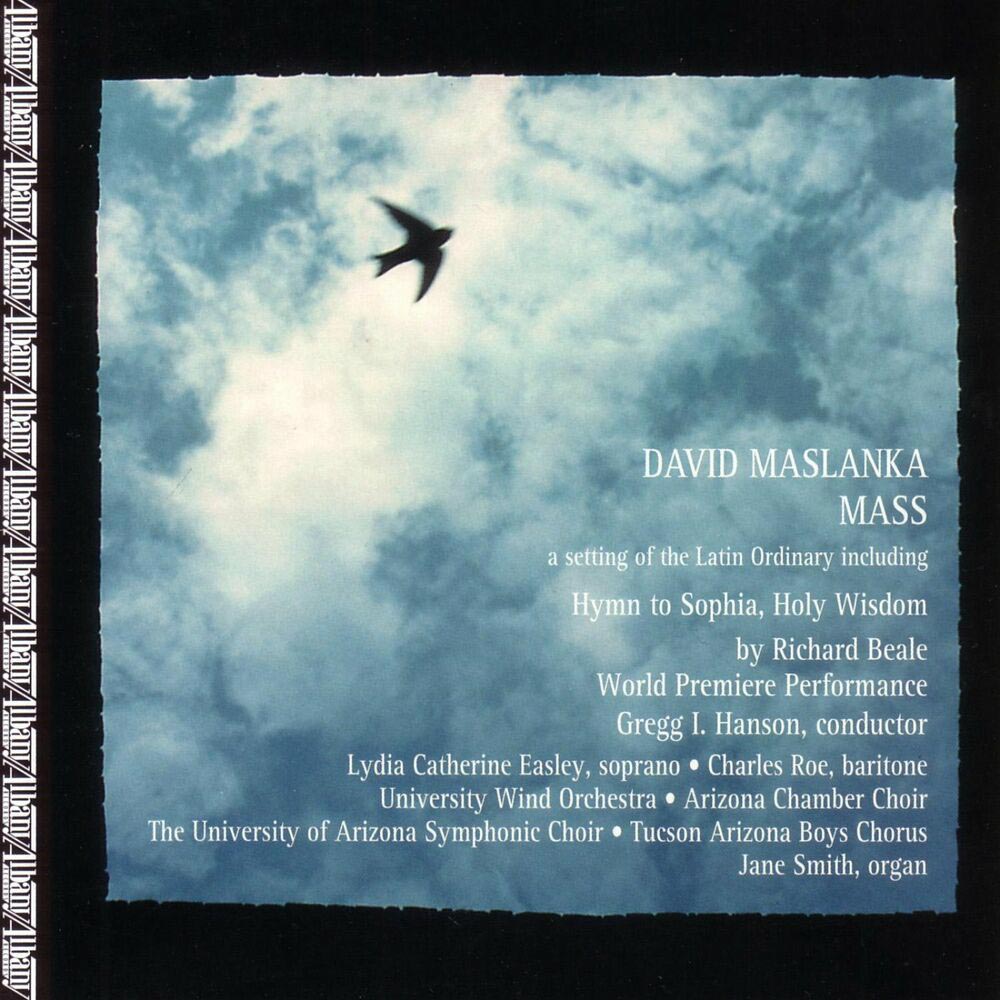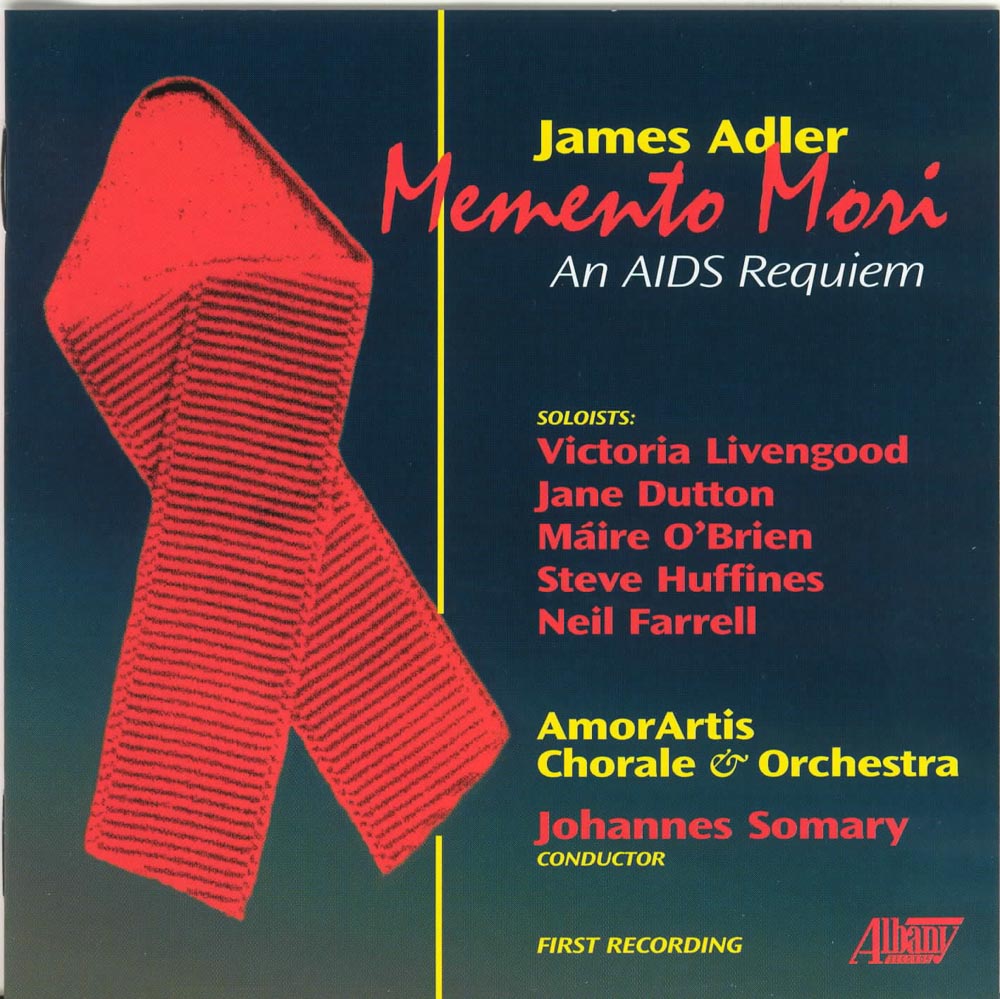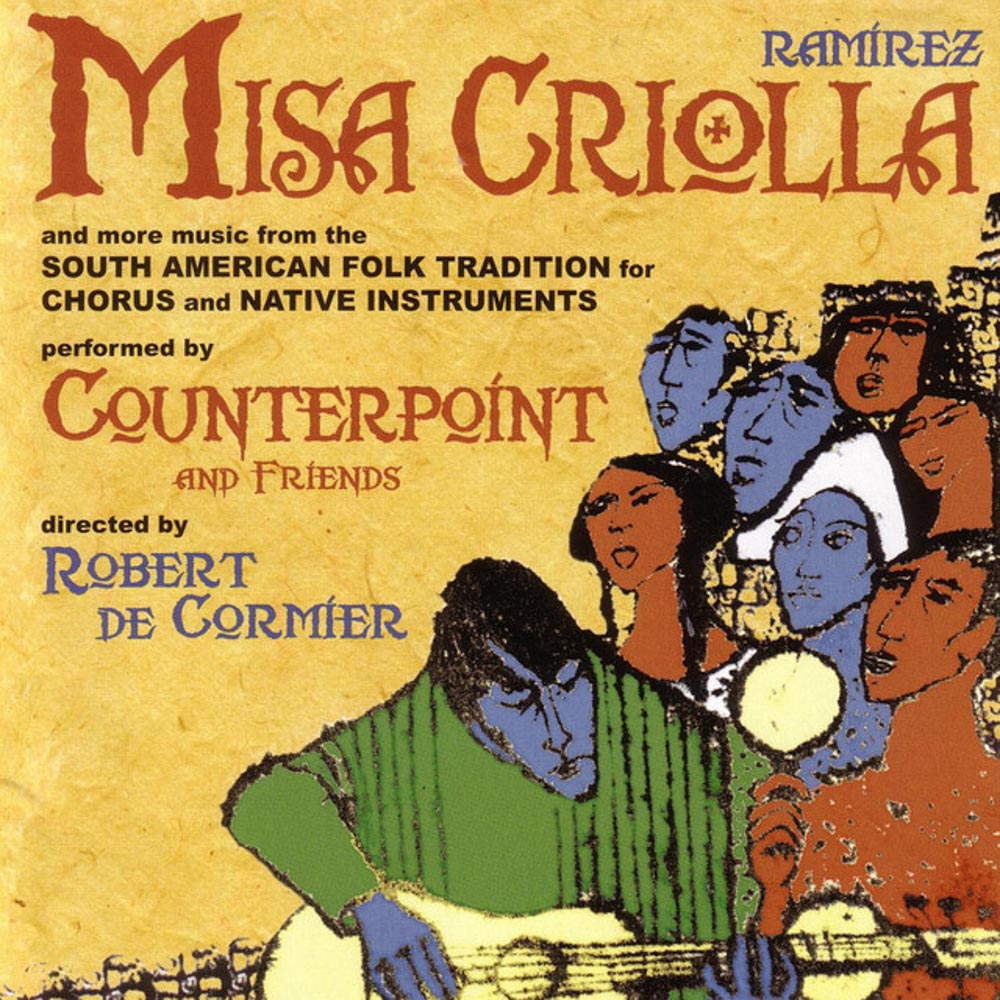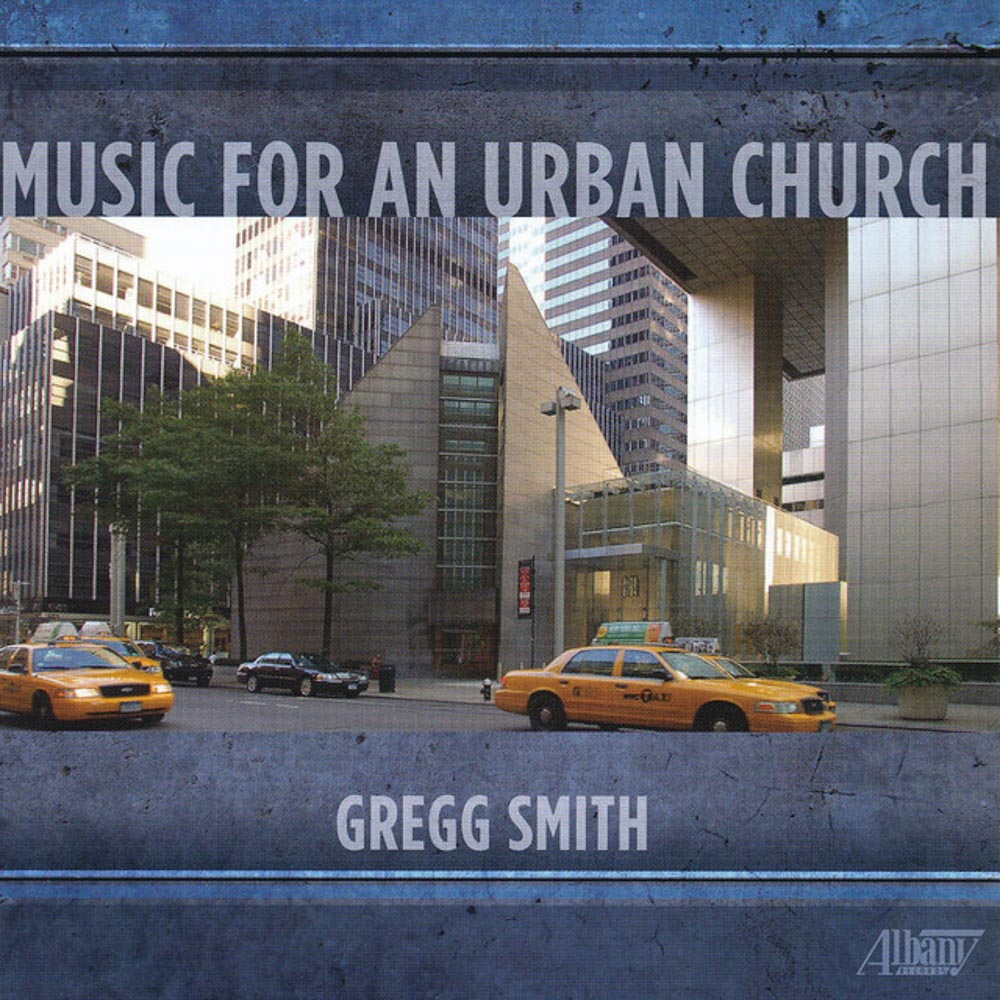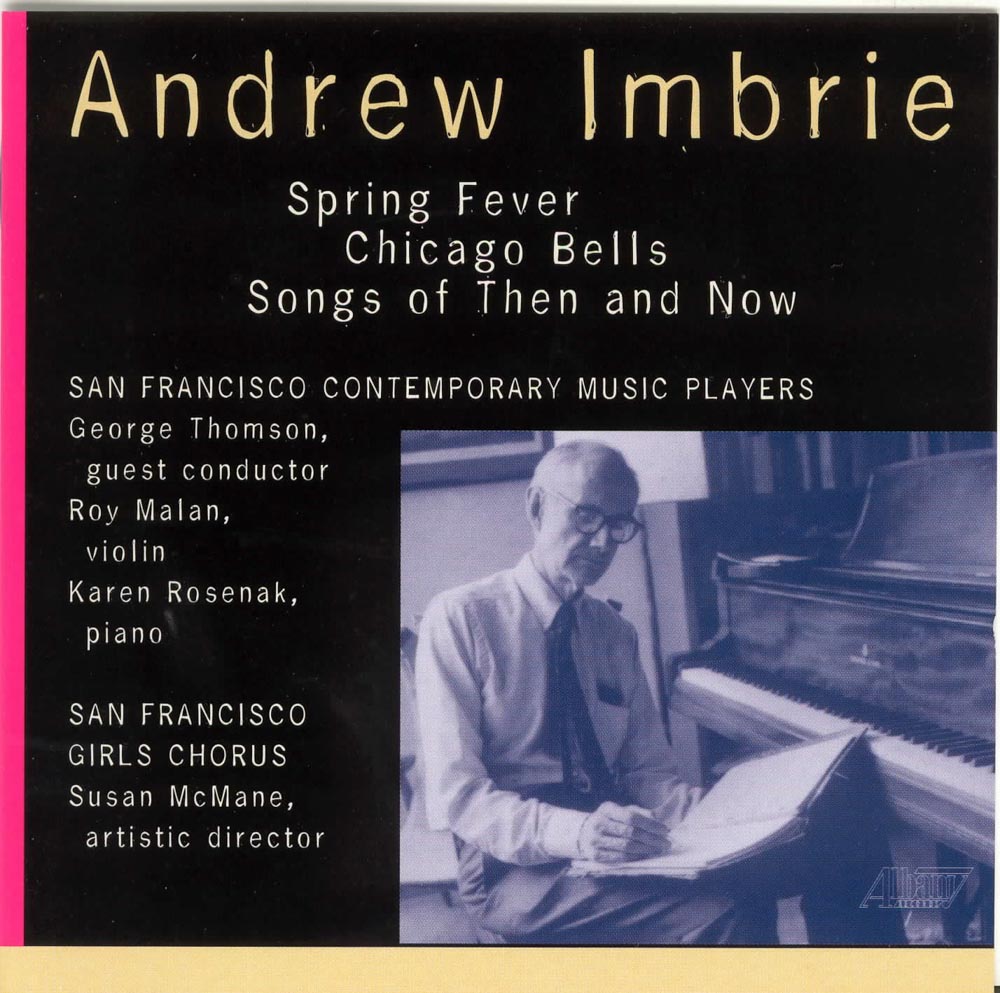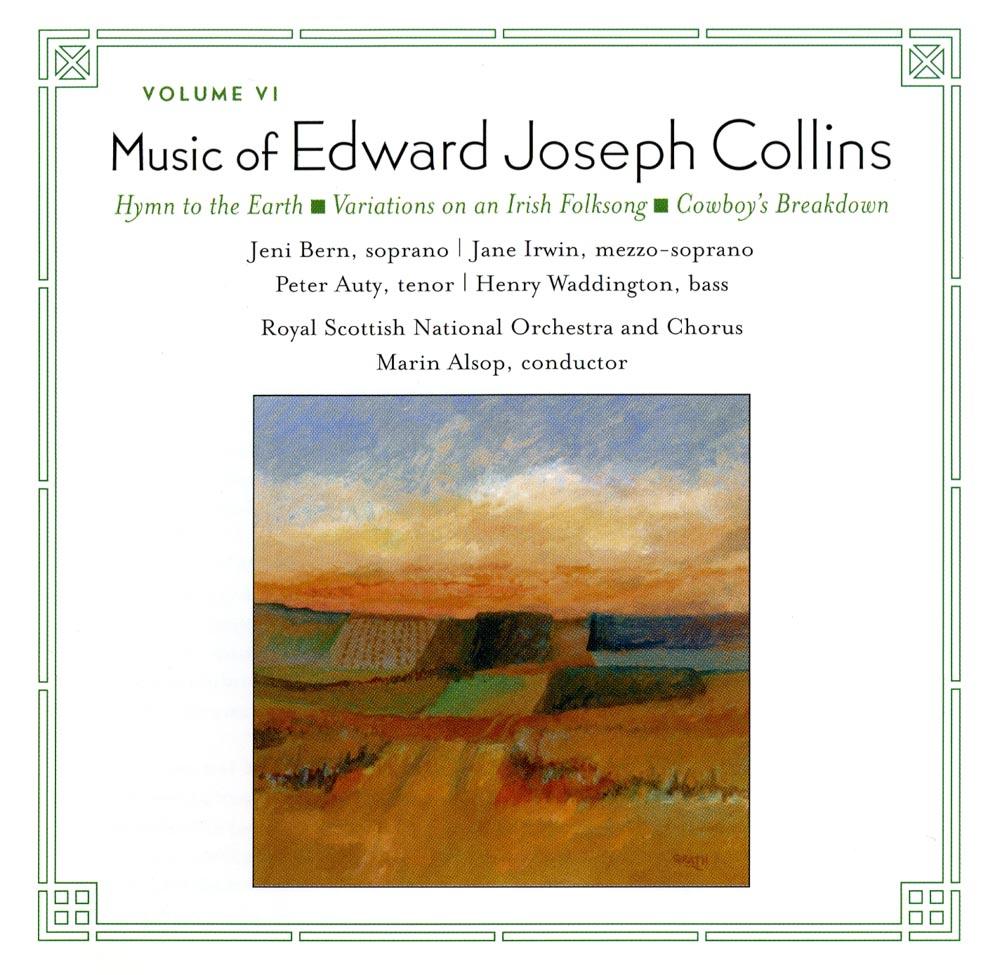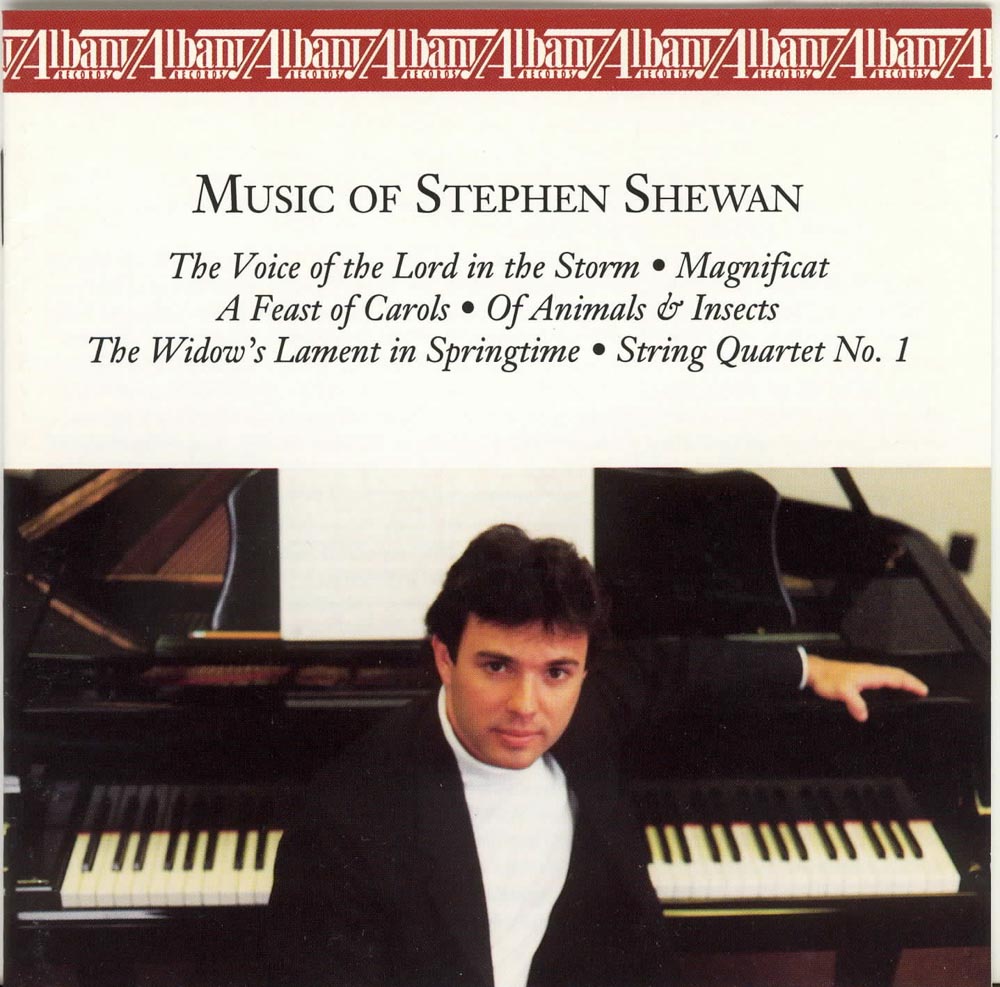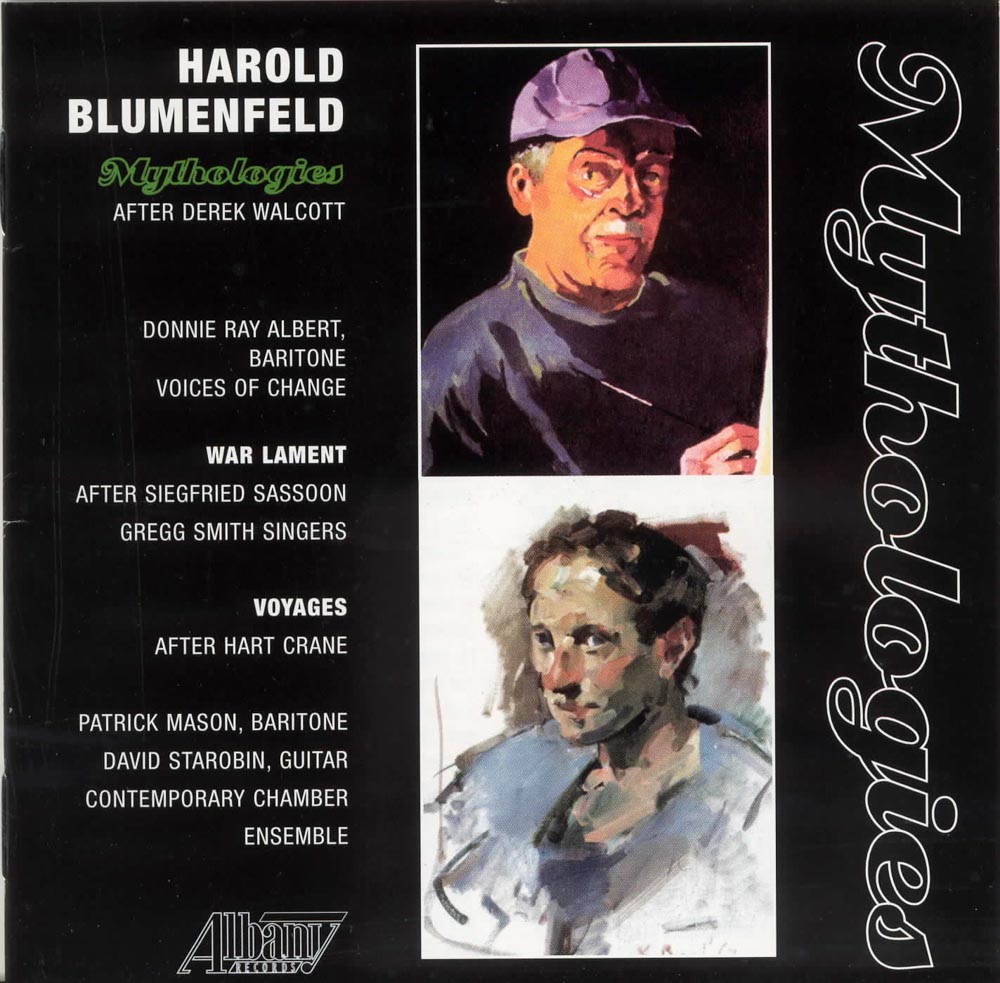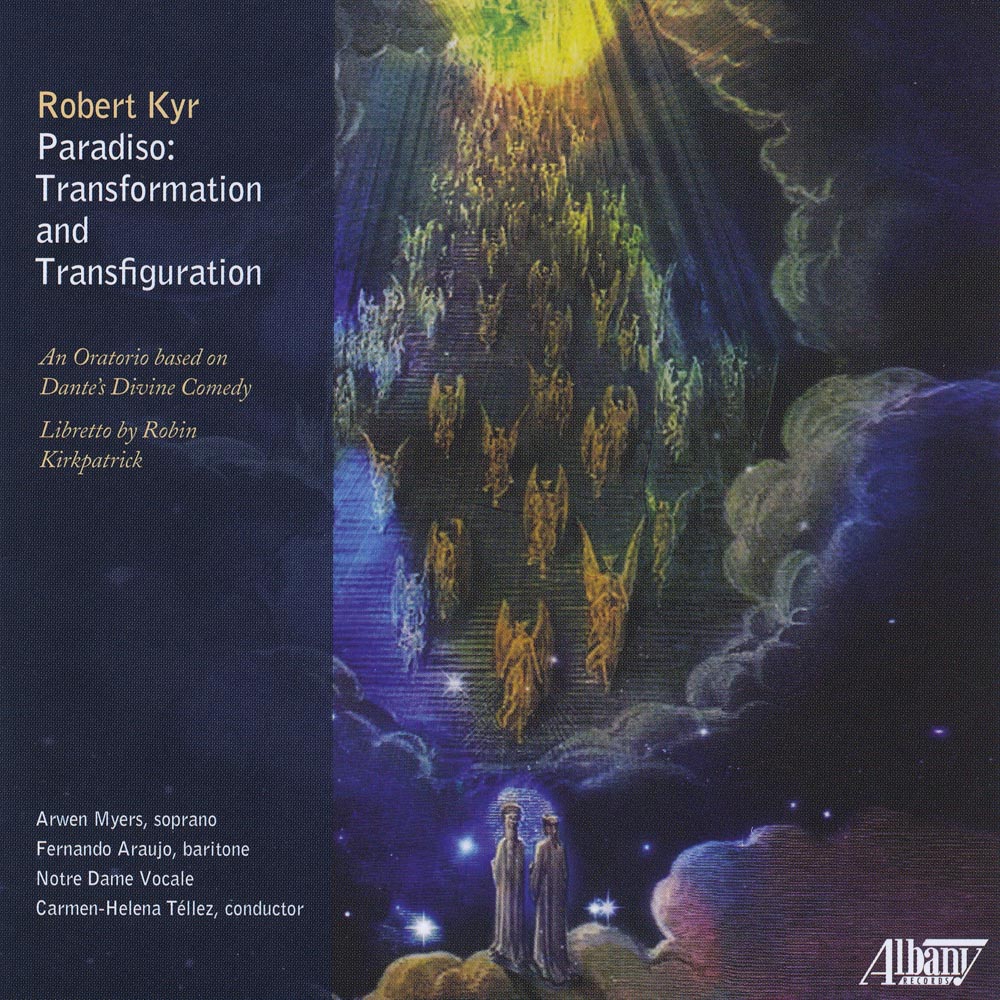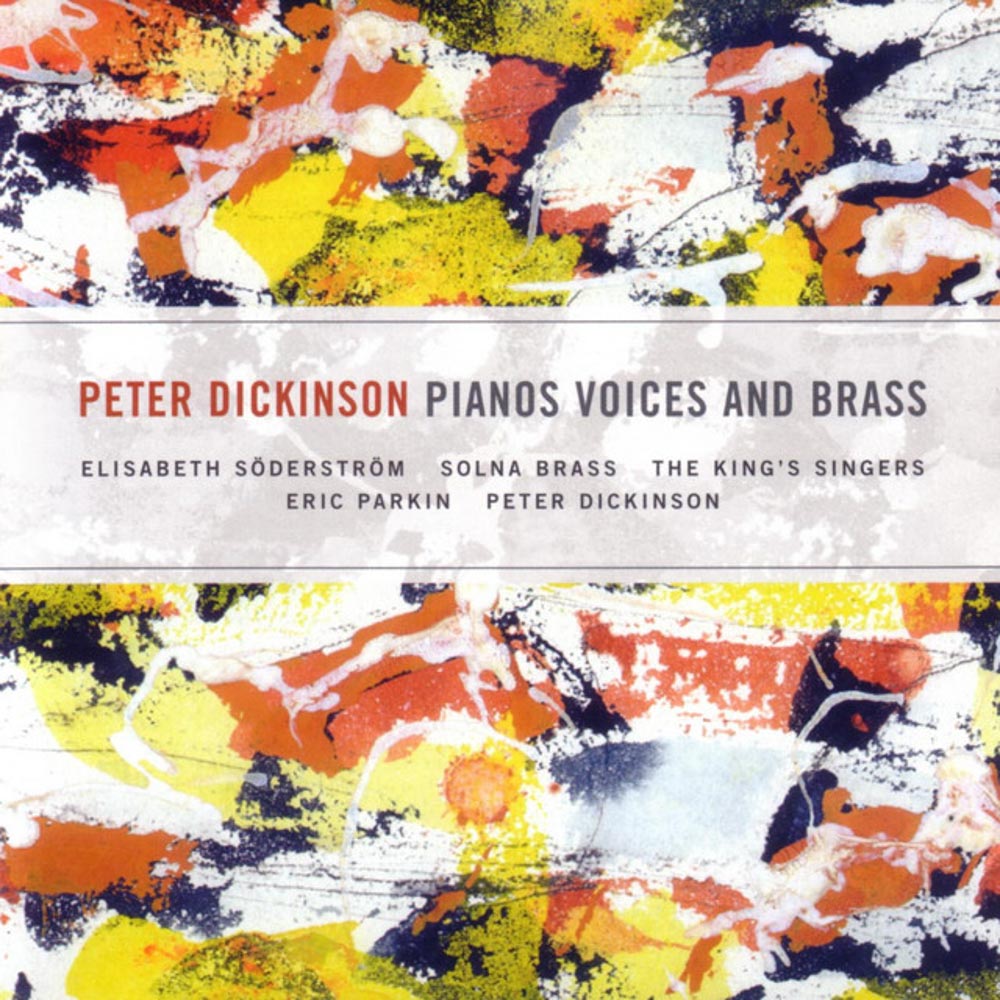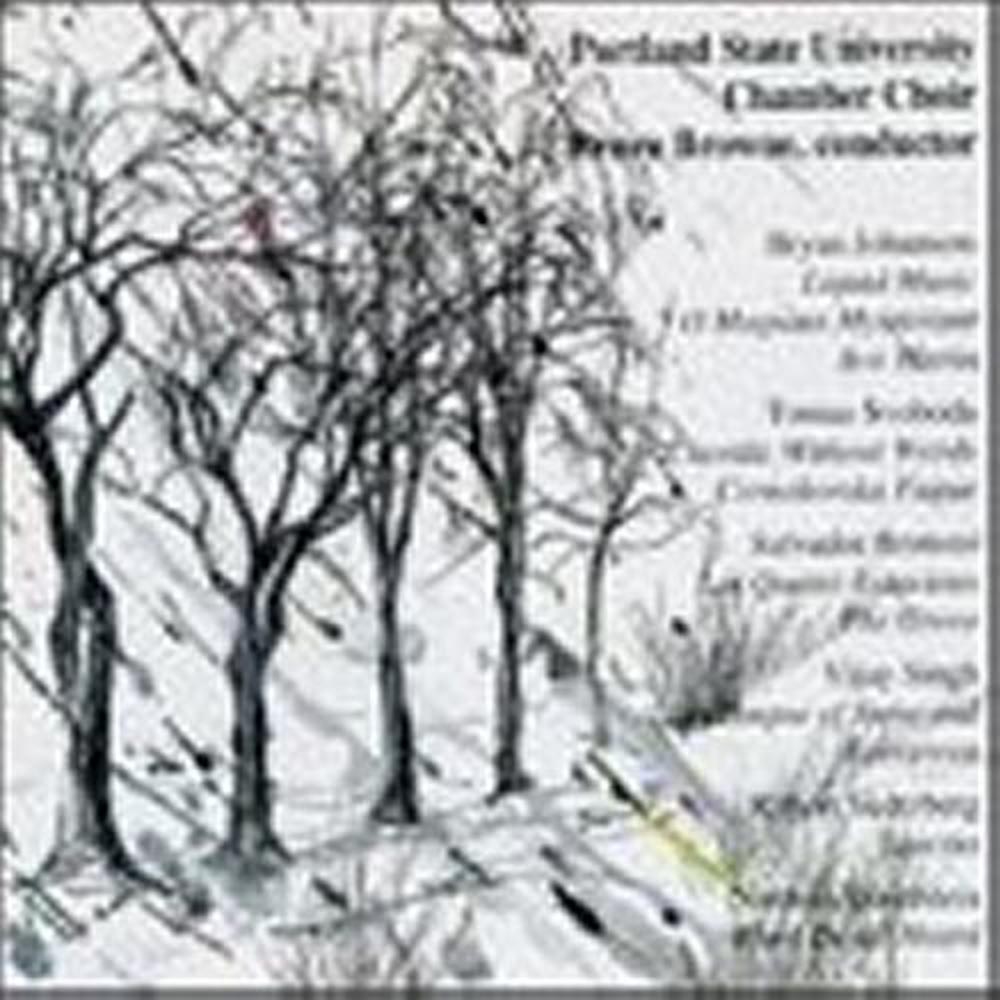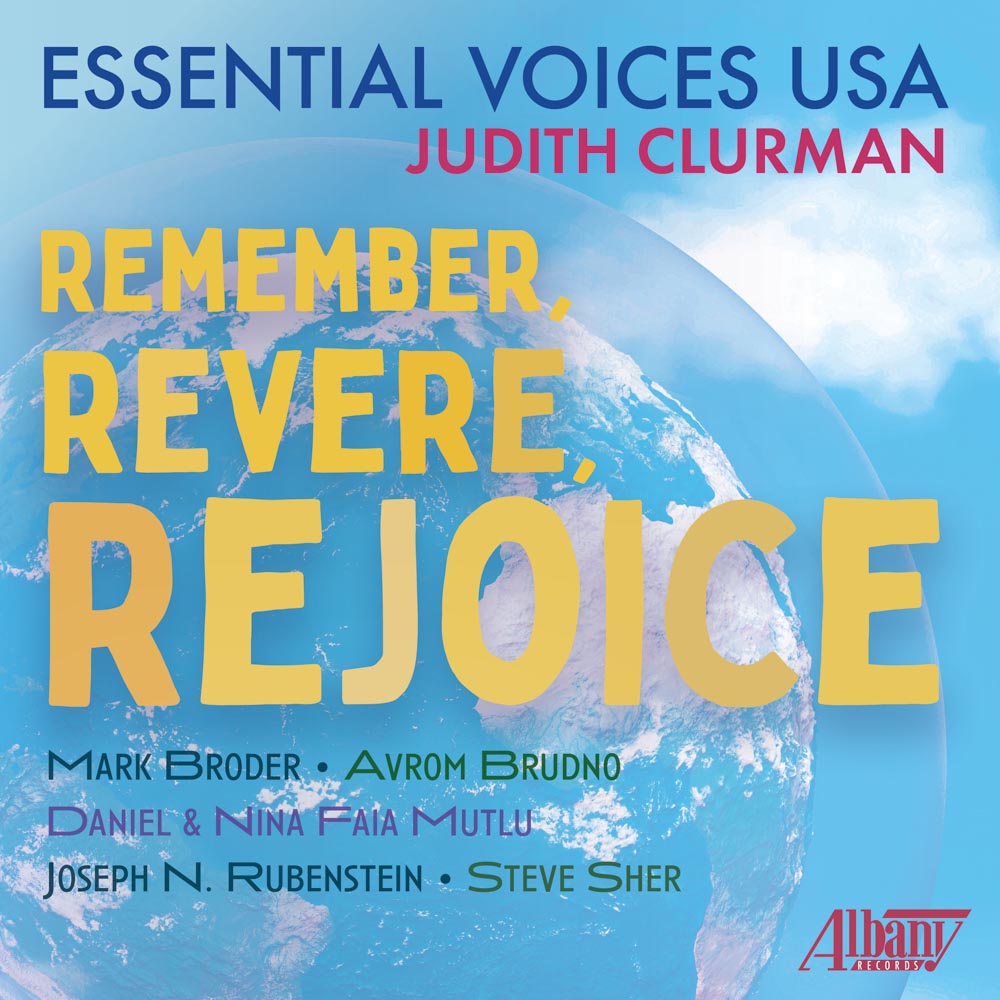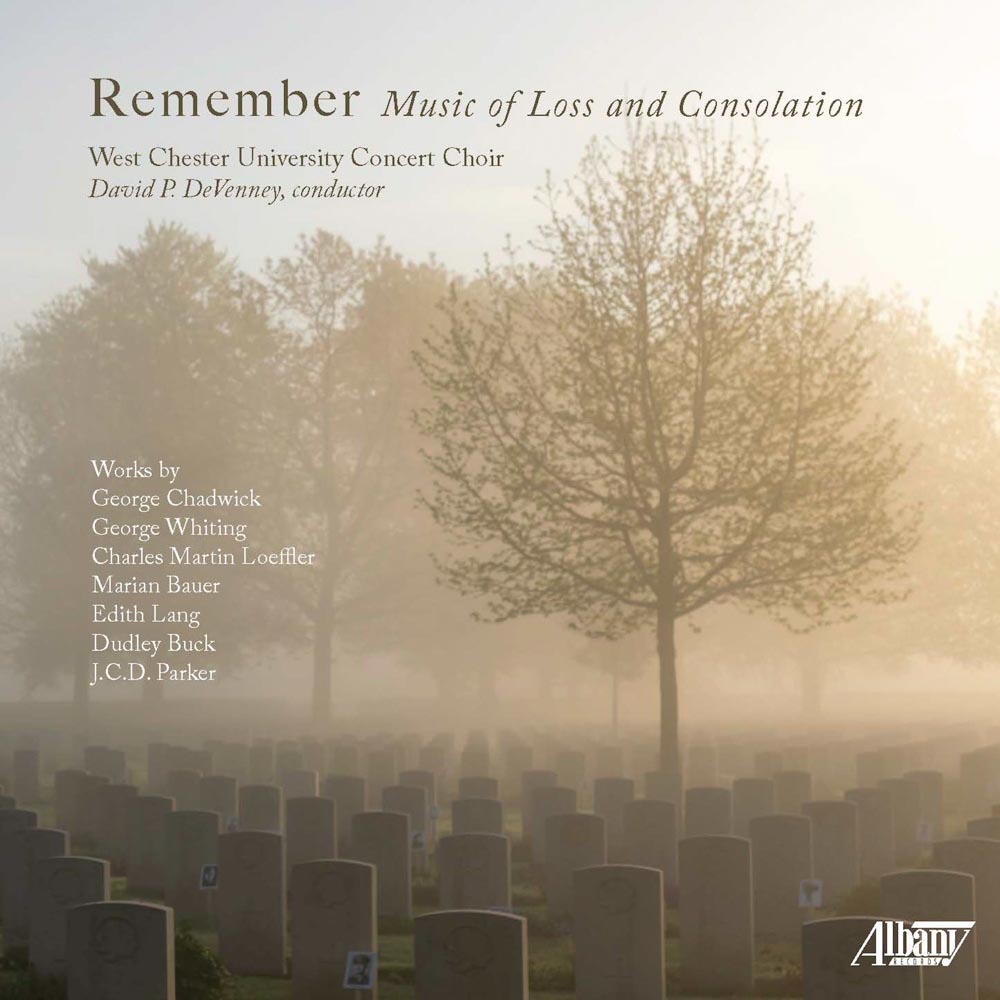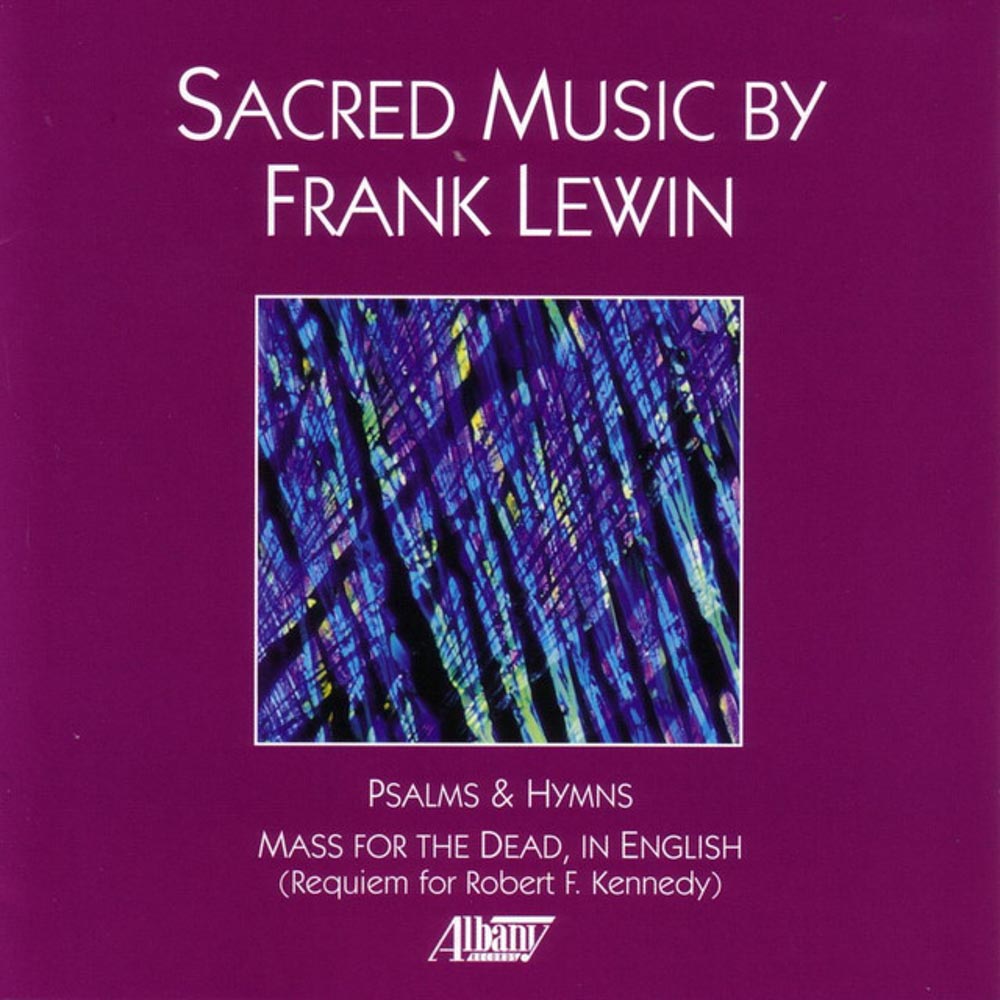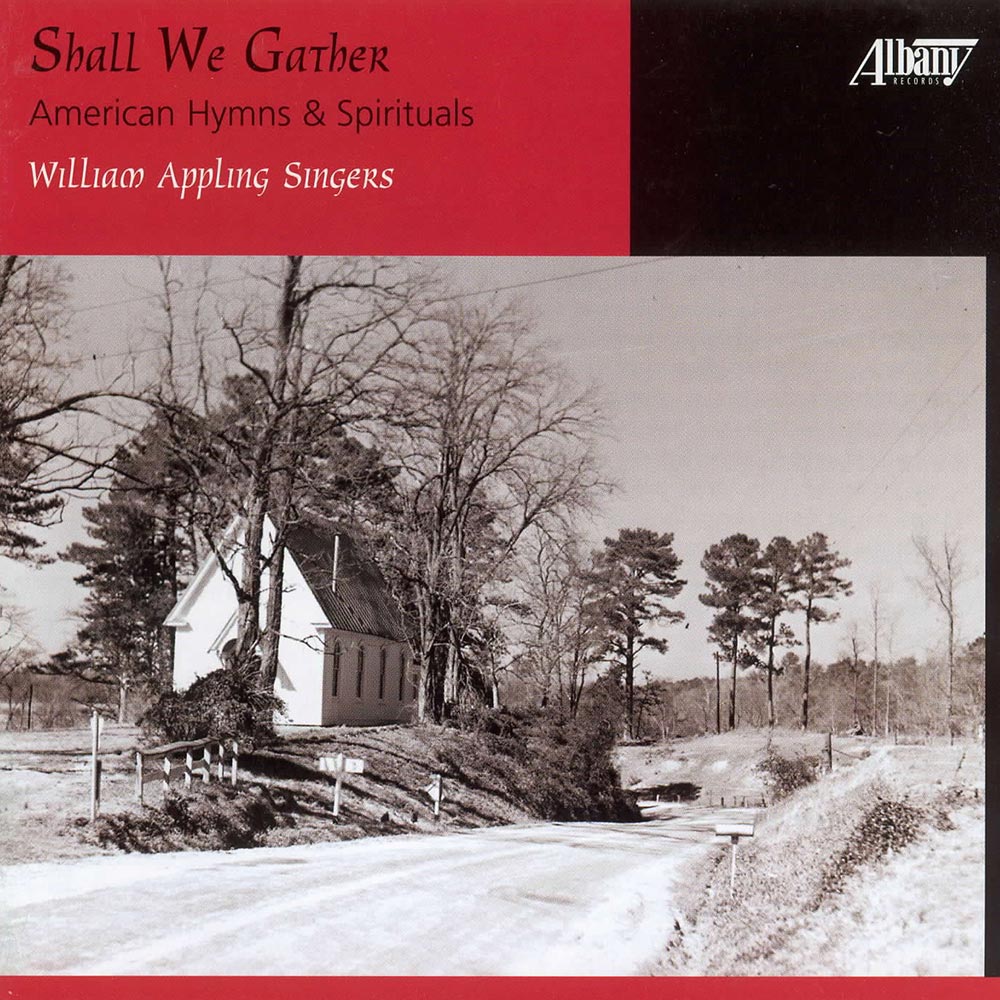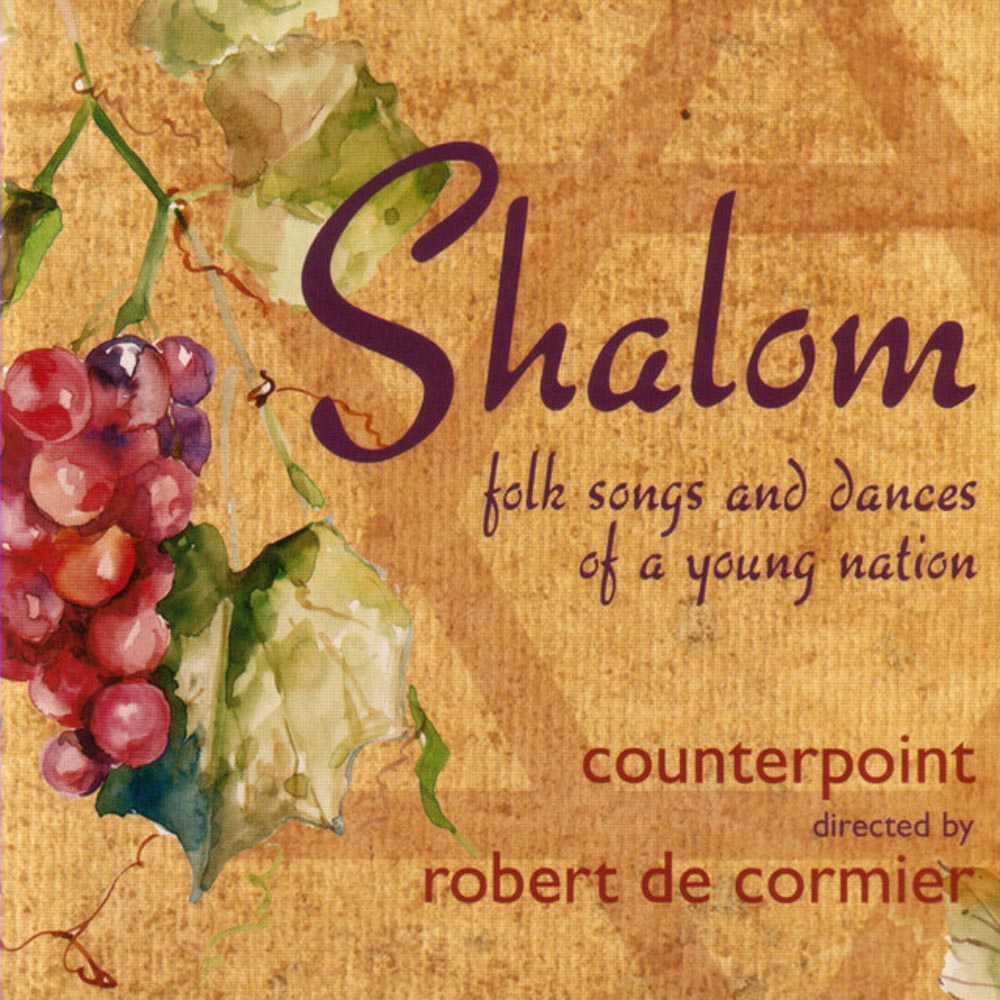Catalog #: TROY0164
Release Date: August 1, 1995ChoralThis new all-Harris disc contains the best of his choral music. In his program notes for this disc, John Proffitt writes: "Roy Harris wrote music especially rich in qualities American regard as reflecting their national life and character - honesty, vigor and expansiveness - a tonal reflection of his western background. This Americanism was not that of the big cities and Tin Pan Alley, but rather was that of the bleak and barren expanses of the western plains, of the brooding prairie night, of stronger, more fundamental emotions than are usually associated with that other musical Americanism, that of Jazz and Broadway." The selections on this CD range from a cappella chorus to chorus with brass and organ. The "Mass," "Alleluia," and "Madrigal" are world premiere recordings. The "Three Songs of Democracy," "Symphony for Voices on Poems of Walt Whitman," and "When Johnny Comes Marching Home" are first stereo recordings.
Catalog #: TROY1715
Release Date: April 1, 2018ChoralConductor Anthony J. Maglione has carefully selected texts that invite us to wrestle with ancient and timeless mysteries and think about how they are relevant to our present day. The centerpiece of the recording is Adolphus Hailstork's I Will Lift Up Mine Eyes, a three-movement cantata based on psalm texts. The William Jewell College Concert Choir is composed of the very best undergraduate choral singers who attend William Jewell College. The choir tours the United States and travels regularly to England and Scotland to perform. Anthony Maglione studied at Westminster Choir College, East Carolina University and the University of California, Los Angeles.
Catalog #: TROY1036
Release Date: November 1, 2008ChoralJack Beeson's musical background resembles those of many another contemporary composer but his storyline diverges from the expected mid-century composer-in-formation's path when he chose to study in New York City with Bela Bartok rather than go to France to work with Nadia Boulanger. His loyalty to Columbia University, where he has worked for more than 63 years, again, breaks the mold. Few of his colleagues can boast of such singular interweaving of individual creativity and organizational fealty. Widely known as he is for his operas, Beeson is no slouch in other areas of vocal music. In addition to his ten operas, he has written many songs and a good number of choral works, seven of which are featured on this recording. The individuality that marks his creative output is evident, showing itself in his selection of texts.
Catalog #: TROY0545
Release Date: December 1, 2002ChoralRonald Perera was born in Boston in 1941. He studied composition with Leon Kirchner at Harvard. He also worked independently with Randall Thompson in choral music and with Mario Davidovsky in electronic music. His compositions include operas, song cycles, chamber, choral and orchestral works, and several works for instruments or voices with electronic sounds. He has taught at Syracuse University, Dartmouth College and, since 1971, at Smith College. The Golden Door was commissioned in 1997 by New Amsterdam Singers and its first performance was at Merkin Hall on June 8, 1999. The Garment of Praise is Part Four of Randall Thompson's Requiem, commissioned by the University of California in 1958. It is a major piece and a choral tour de force. Using biblical texts, Thompson writes for unaccompanied double chorus. The style has much in common with the polychoral works of Schutz. With its moving simplicity and direct appeal, it needs no explanation in order to be appreciated. Paul Alan Levi's Act of Love was commissioned by New Amsterdam Singers in connection with the chorus's 30th anniversary in 1998. Levi was also born in 1941 and was educated at Oberlin, the Juilliard School and Columbia University. His principal teachers were Hall Overton and Vincent Persichetti. Levi is currently on the faculty of the Manhattan School of Music. He has also taught at the Aaron Copland School of Music at Queens College, New York University and Rutgers. Ricky Ian Gordon was born in 1956 into a show business family (his mother was a singer). He studied piano and then composition at Carnegie Mellon University, where he discovered theater, acting and writing songs for drama department productions. His passion for American 20th century poetry and drama is evident in his choice of lyrics for recent compositions. Three by Langston, commissioned by Keynote Arts Association for the 1998 Manhattan Choral Festival, is set to poems by Langston Hughes and is a blend of the best in popular and classical American music.
Catalog #: TROY0820
Release Date: March 1, 2006ChoralJacob Avshalomov is one of the great veterans of American music. He studied with his father Aaron, as well as Ernst Toch, Bernard Rogers and Aaron Copland. His orchestral, instrumental and choral works are full of classic American melodies, rhythms and harmonies; in short, the kind of music "they don't write anymore." Serious listeners to American music have him to thank for those pioneering recordings from the late 1950's and early 1960's with his beloved Portland (Oregon) Youth Symphony, which introduced many of us to composers such as Benjamin Lees and William Bergsma. This disc features his wonderful choral music, much of which is based on texts by his wife Doris. These works all fall into the great American choral tradition of Randall Thompson and Copland. More of Avshalomov's music can be heard on TROY115, 160, 249, 296 and 502.
Catalog #: TROY0682
Release Date: September 1, 2004ChoralJohn Schlenck was born in Indianapolis. At age 21, he graduated from the Eastman School of Music with a major in composition and moved to New York City. There, he soon discovered his affinity with Indian thought and joined the Vedanta Society of New York. Serving as its music director since 1961, Schlenck has composed many songs and a number of larger works with Vedantic and other spiritual texts. His instrumental works include three symphonies, a piano concerto, and numerous chamber and solo compositions. After traveling the length and breadth of India for three years as a mendicant friar, Swami Vivekananda arrived at Kanyakumari, the southernmost tip of the country, in late December, 1892. This place of pilgrimage contains a temple to Goddess Kanyakumari, an aspect of the Universal Mother. About a quarter mile from shore, twin rocks jut out from the sea. After worshipping at Mother's temple, Vivekananda swam through the turbulent, shark-infested waters to the farther of the two rocks. He remained there for three days and nights on the solitary rock, meditating intensely on the condition of India - her present degradation, the misery of her people, her past glory and future potentialities. The composer writes: "in the winter of 1981-82, I spent three months in India, visiting many of the places where Vivekananda had stayed, meditated and taught. A high point was my visit to Kanyakumari. I was profoundly moved by the drama and pathos of Vivekananda's tour through India, by his compassion for the suffering people and by the nobility of his vision." It was from the recollections of this trip that the music on this CD was composed.
Catalog #: TROY0478
Release Date: September 1, 2001ChoralArmenian composer Sirvart Kalpakian Karamanuk was born in Istanbul in 1912. She studied at the Istanbul Municipal Conservatory, graduating in 1939. Her first compositions, written in the 1940s, were for the piano. She gradually broadened her musical interests, composing numerous art songs, choral works, large-scale compositions for chorus and orchestra as well as chamber works and arrangements of liturgical chants. Like many composers of the Armenian diaspora, Karamanuk's creative concerns focus on maintaining a link with Armenian church music and folk song and absorbing the classical traditions of Armenian culture. In molding her own musical language, Karamanuk borrows from Armenian oral tradition. This recording of her songs includes a cantata and was the first large-scale setting of poems by Armenian poet Bedros Turian.
Catalog #: TROY0736
Release Date: April 1, 2005ChoralAlexander Levine was born in Moscow and studied piano from the age of six at the Gnessin Music School, and later he took up the clarinet. Upon graduation he was offered a place at the Moscow Gnessin Music Academy. During his college years he also held the position of Principal Guitar in the Orchestra of Russian National Radio and Television. In the years that followed he established himself as a composer working in collaboration with a variety of highly acclaimed performers in Russia. Since 1992, he has lived in the United Kingdom. He then continued to pursue his musical studies at the Guildhall School of Music and Drama where he studied with among others, Simon Bainbridge. The title Kolokola translates into English as church bells or rather the toll of the bells. A great deal can be said about the religious, historical, and philosophical aspects of bell ringing, and in Russian culture it had always been a particularly powerful, almost archetypal image. This image of church bells prevails throughout the entire work, which was originally conceived as a projection of various aspects of human existence with a wide range of historical, religious and Russian folklore cross-references. There are complete Russian/English texts included in the program booklet.
Catalog #: TROY1655
Release Date: January 1, 2017ChoralBruno Skulte (1905-1976) was a talented composer as well as a dynamic conductor and organist. He drew most of his inspiration from the culture of his Latvian homeland even though he lived in Germany and the United States. Skulte left Latvia for Germany when the Soviets invaded in World War II, along with thousands of other Latvian refuges. He emigrated to the U.S. in 1949 and lived the rest of his life there. He was the organist and choir conductor for the Latvian Lutheran Church of New York as well as two other Latvian choirs. He carried on the tradition of Latvian song festivals with hundreds and even several thousand singers on stage. While he never stopped composing, his works were not heard in Latvia during the Soviet occupation as they were deemed too "Latvian." His choral music is sonorous, lyrical, emotional, at times dramatic, and always sincere. The Latvian coloring is created mostly by the lyrics. Skulte used lyrics that seemed to express Latvian sensitivities: love of nature, love of country and other virtues taught by the dainas, the ancient Latvian folk poems. He died in New York, never having been able to revisit his beloved Latvia.
Catalog #: TROY1851
Release Date: December 1, 2020ChoralAn annual tradition of the New York Latvian Choir is to perform an Advent concert. Since the repertoire was limited, the choir launched a project to commission a new composition every year from a different Latvian composer. To date this ongoing project has contributed 40 Christmas cantatas to the Latvian music repertoire. The works of the four composers on this recording have created an overview of Latvian Christmas traditions over multiple centuries. The work of Andrejs Sejans is closely tied to early religious traditions; with Martins Brauns weaves the texts of Latvian poets with his music; Andrejs Jansons has created a work reflecting a classical Latvian Christmas cantata; and Laura Jekabsone's work is a contemporary Christmas composition.
Catalog #: TROY1389
Release Date: December 1, 2012ChoralMusic has been a strong political, unifying force for the Latvian people. It rose slowly, out of folk songs, during the 700 years of oppression by Russian tsars and German overlords. Poetry and song, with their indirect and symbolic undertones, became an inside language a way of passing on messages, revisiting legendary heroes and building confidence. Latvian composers have fused their folklore with contemporary trends and this recording is an example of this fusion. Cantatas for the Christmas season by three of Latvia's most well-known composers are offered. Sung by the New York Latvian Concert Choir with the Latvian National Opera Chamber Orchestra conducted by Andrejs Jansons, the recording was made in Latvia in February, 2012. The New York Latvian Concert Choir was founded in 1975. Since the break up of the Soviet Union and the re-establishment of Latvia's independence, the choir has regularly collaborated with choirs and soloists in Latvia. Its mission has been to keep alive and promote Latvian music within the Latvian communities of the U.S., Canada, Australia and elsewhere and to introduce these countries to Latvia's ongoing cultural heritage.
Catalog #: TROY0896
Release Date: December 1, 2006ChoralDirected by the renowned Robert De Cormier, the professional vocal ensemble Counterpoint debuted in 2000. Dedicated to promoting choral chamber music and giving the public the opportunity to hear rarely performed works and unique arrangements, their concerts and recordings have a devoted following. In addition to this new CD, they can be heard on Albany TROY676, 746, 801 and 823. De Cormier writes, " I have been involved in African-American music, in one way or another, for almost 60 years. In 1948 I became the music director at Camp Unity, an interracial holiday camp, whose clientele were just about half black, one-half white. Every Sunday a chorus would be recruited from the new campers and rehearsals would begin on Monday. On Friday or Saturday night we would perform together as part of the weekend program. Almost every concert included some African-American music...in 1963 the De Cormier Singers, a professional vocal ensemble, made its debut in New York City. For the next 25 years we toured the United States and Canada. We were always an interracial group and the concert programs almost always included African-American material. Many of the songs on this new CD were originally arranged for them.
Catalog #: TROY0542
Release Date: September 1, 2002ChoralThis unusual, beautifully sung recording by the University of Miami Chorale is their second release on Albany Records. The Chorale was founded in 1993 and has established itself as one of the nation's leading collegiate choral ensembles. Noted for its innovative and versatile programming, the Chorale prides itself in singing literature of the Twentieth Century. Jo-Michael Scheibe is a Professor and Program Director of Choral Studies at the University of Miami. He is widely recognized for his work with contemporary choral literature, new music commissions and young composers. Five Hebrew Love Songs by Eric Whitacre was commissioned for the Chorale. The other grouping to note on this recording is an eclectic missa brevis, put together from masses by William Byrd and Frank Martin.
Catalog #: TROY0221-22
Release Date: November 1, 1996ChoralThis is a live recording of the world premiere performance of this work that took place in April, 1996 and as such there is some noise and a few rough spots, but this is music of the highest order that is well worth hearing. Mr. Maslanka calls his new composition Mass, a setting of the Latin Ordinary including Hymn to Sophia, Holy Wisdom by Richard Beale. This is a very serious piece of music in a vein similar to Britten's War Requiem. Maslanka writes: "Almost from the start of my thinking about the Mass, I was moved to include the female creative or the Holy Mother, an image that has arisen in many forms in my meditative life. I asked my friend Richard Beale to consider the problem. His marvelous and almost instantaneous response was "Hymn to Sophia, Holy Wisdom," a set of seven poems on the Holy Mother theme, that I have used in my setting of the Mass as preludes to the Latin texts." As you can see from the forces listed that are needed to perform this Mass, it is a huge work. The recording itself captures beautifully the sheer magnitude of the sound of this music.
Catalog #: TROY0463
Release Date: October 1, 2001ChoralMemento Mori is an oratorio for soloists, men's chorus and chamber orchestra. It is dedicated to those who have succumbed to AIDS. The work combines traditional English, Hebrew, and Latin texts with original prose and poetry by Quentin Crisp, Philip Justin Smith, Denise Stokes, and Bill Weaver. About this new work James Adler writes: "Where to begin? The road to this recording has been a longish, winding one. It began in 1994 when Jeffrey McIntyre, then director of the Atlanta Gay Men's Chorus, first talked about and then commissioned me to compose this work. I had lost so many colleagues, friends and loved ones to the disease that I simply had to do something. And my way was going to be a musical way. I did not set out to compose something diverse or unusual. It was my initial intention to create a work that could be emotionally gut-wrenching, quasi-theatrical, and religious in a spiritual sense. Jeffrey and I both shared the vision that while my Requiem should use as its model the Roman Catholic "Mass for the Dead," it should also feature some special twists and turns." Composer/conductor/pianist James Adler has been hailed as a composer who "writes for both chorus and orchestra with uncommon imagination." Following the April 2000, New York City premiere of his Requiem, in Merkin Hall, Bill Zakariasen acclaimed this "very ecumenical and consoling" work, which "gets straight to the heart."
Catalog #: TROY0746
Release Date: April 1, 2005ChoralThis recording brings together a variety of choral works by 20th century Latin American composers, all of whom find inspiration in folk culture. Chief among the composers represented here is Ariel Ramirez. Born in Santa Fe, Argentina, he roamed the South American hinterland in his early twenties playing piano and studying regional musical traditions. After a brief stint in Buenos Aires, he spent several years in Europe, studying in Madrid and Vienna and teaching music in a German convent. Returning to South America in 1954, he completed his musical training in Buenos Aires, where his politically engaged popular songs rapidly earned him renown as a leader of the nueva cancion movement. His breakthrough onto the international stage came in 1967 with the first performance and recording of the Misa Criolla (Mass in Native Style). The success of this innovative work owes much to its timing. Set in Spanish rather than Latin, it was one of the first major masses composed after the Second Vatican Council mandated the use of the vernacular. It also profited from the period's burgeoning interest in folk music. As a result, the work quickly captured the imagination of audiences worldwide and has received thousands of performances. The mass's reception abroad, where its style was perceived as novel and exotic, actually helped stimulate appreciation for native culture among more skeptical audiences back in Argentina. Like all Ramirez' major works, the Misa Criolla draws substantially on the folk traditions in which he immersed himself as a young man. There are complete English texts for all the works included in the program booklet.
Catalog #: TROY1463
Release Date: January 1, 2014ChoralThe association of composer/conductor Gregg Smith, the Gregg Smith Singers and Saint Peter's Church in New York City dates back to 1970. Smith wrote works for the church, some of them commissioned for special occasions, and conducted the Gregg Smith Singers along with the Long Island Symphonic Choral Association and the Saint Peter's Choir in performances of this music. This disc commemorates this association with a collection of six of these works, written and performed between 1972 and 2005. Music for an Urban Church celebrates this American composer's continuation of the tradition of "singing unto the Lord a new song." As a composer Gregg Smith has more than 400 compositions to his name and he is also celebrated as the founder and conductor of the world-famous Gregg Smith Singers.
Catalog #: TROY0538
Release Date: October 1, 2002ChoralAndrew Imbrie has enriched the American contemporary music scene for over five decades. This recording pays tribute to his legacy with performances of three compositions from the late 1990s. His fluency at the keyboard springs from his early training in piano with such teachers as Leo Ornstein, Olga Samaroff, Rosalyn Tureck and Robert Casadesus. These teachers (and a summer studying with Nadia Boulanger) nurtured his interest in theory and composition, but it was during his undergraduate years at Princeton that he found his most significant musical mentor, Roger Sessions. Imbrie's senior thesis, String Quartet # 1 (1942), won a New York Music Critics' Award in 1944 and was recorded by the famed Juilliard String Quartet. After military service during World War II, Imbrie followed Sessions to the University of California,. Berkeley and received his master's degree there. Upon graduation, Imbrie was offered a faculty position at Berkeley that he held until his retirement in 1991. For over four decades, Imbrie has served as a teacher and mentor for composers ranging across the stylistic spectrum from experimentalist Larry Austin to the mischievously "traditionalist" David Del Tredici. He has held visiting professorships at the University of Chicago, Northwestern University, New York University, and Harvard. About Spring Fever the composer writes: "This work was begun in Berkeley but completed in Chicago on November 26, 1996. Its title reflects, perhaps, my sense of the onset of winter in that city, and my yearning for spring, with its varying excitements and instabilities." Chicago Bells was commissioned by the McKim Fund in the Library of Congress. It was premiered there in May 2001, by the soloists heard on this disc. "This work was composed in 1997, while I was serving as guest professor at the University of Chicago. I would walk through the campus on my way to meeting with my students; and as I proceeded through the myriad quadrangles I would occasionally hear the sound of bells in the towers, echoing and clanging. This sound was the inspiration for the opening of the work and influenced it in various ways." Songs of Then and Now, settings of poetry by Robert Louis Stevenson, William Shakespeare, and e. e. cummings, explore the ebullience, disillusionment, love, and magic of growing up. "The title of this group of songs can have two meanings: one that draws attention to the variety of texts used; the other referring to the ages of the singers, who have just crossed the threshold and are now young adults. Then refers to vivid memories of recent childhood; now suggests a wide-open world of discovery."
Catalog #: TROY0650
Release Date: April 1, 2004ChoralThe motivation to compose a choral work on a grand scale seems to have arisen from a commission from New York's Society of the Friends of Music to Edward Collins. There is, however, no record of a performance by the Society. A microfilm copy of the score was found in the late 1980s by composer and choral conductor William Ferris. He conducted what may have been the first performance on June 2, 1989 in Chicago. The Society's commission likely prompted action by Collins on an idea that may have been percolating for some time, something that could encompass his feelings about nature and life. Inspiration was found in the Wisconsin countryside each summer at the cottage of his wife's family on Cedar Lake, or on the Door County Peninsula. By the time Collins addressed himself to his Hymn, choral works were no longer quite as fashionable as they had been in the 19th century. The score achieves a distinct grandeur, while Collins's own text reflects his familiarity with great writing: it is, if somewhat elevated and archaic in tone, literate and eloquent. Though the source scores are not clearly dated, the composer's journals indicate that the composition of Variations on an Irish Folksong was probably completed after the 1927 Irish Rhapsody and the 1929 Hibernia(Irish Rhapsody). These Variations are based primarily on "Oh! The Taters they are small over here!" the "potato famine" folksong that also is used by the composer, sparingly, in Hibernia. The earliest version of Cowboy's Breakdown for piano solo, is found in a music notebook. Collins initialed and dated the score December 10, 1935, near the title; above the final measure he wrote the date January 10, 1936. It is interesting to note that Aaron Copland's "cowboy" ballets, came after Collins's concise, though equally energetic, Cowboy Breakdown, published in 1938.
Catalog #: TROY0756
Release Date: May 1, 2005ChoralJohannes Somary has achieved international prominence as conductor, composer, and organist. He is now in his 44th season as founder and Music Director of AmorArtis in New York. As a composer, he has won critical acclaim for his oratorios Ballad of God and His People and The Ultimate Quest as well as his dramatic cantata Is This Life?, given its premiere at the Kennedy Center in Washington, DC in 1994. As an organist he has received critical acclaim for his recording of the Handel concerti. As a teacher, he served for nearly four decades as chairman of the arts-and-music department at Horace Mann School. He is currently artist-in-residence at the Church of the Blessed Sacrament in New York City and in his 30th year as conductor of Connecticut's Fairfield County Chorale. He was born in Zurich, Switzerland and graduated from Yale University. The composer writes: "Taroko Concerto for Violin and Orchestra, is so named because much of the melodic material first came to me on walks with a friend in a little mountainous region of Taiwan called Taroko. It was composed during the two months following my departure as music director of Saint Patrick's Cathedral in New York. It was completed in October, 2003 and is in four movements. Easter Fantasia was first composed as a sonatina for trumpet and organ. In this form it was frequently performed by Martin Berinbaum, with me at the organ. It was re-designed for trumpet and orchestra in February, 2004. Much of the thematic material is based on Gregorian chants proper to the Easter season. The ancient hymn of thanksgiving known by its first two words, Te Deum, is still sung at the end of Matins on Sundays and on major feast days in convents, monasteries, and some churches all over the world. It is a jubilant hymn of praise to the Almighty. The Te Deum for the Millennium, which was commissioned by the International Order of Benedictines, was composed in 1999 and premiered in New York on May 23, 2001. The work is a celebratory cantata scored for soloists, chorus and chamber orchestra."
Catalog #: TROY0149
Release Date: April 1, 1995ChoralThis is a recording devoted exclusively to the music of the young American composer Stephen Shewan. Shewan was born in Warsaw, New York in 1962. He is a graduate of Robert Wesleyan College and Ithaca College. He studied composition with Samuel Adler at the Eastman School of Music while pursuing his doctorate in music education. His is a fresh voice which Albany Records is pleased to bring to your attention. Shewan composes in an accessible idiom that should appeal to a broad audience.
Catalog #: TROY0443
Release Date: June 1, 2001ChoralHarold Blumenfeld is a composer given to language, languages and the human voice. Born in Seattle of musical parents, he studied at Yale with Hindemith, in Zurich, and trained with Leonard Bernstein and Boris Goldovsky at Tanglewood. In the Sixties, from his academic base at Washington University, he launched the Opera Theatre of St. Louis, forerunner of the present company, focusing on the production of early and contemporary works. During a 1970 summer residency at Yaddo, he drafted the choral War Lament, converting the forceful World War I poetry of Siegfried Sassoon into a polyphonic protest against the Vietnam War. Though still loosely anchored in a kind of "neo-classicism", this work, with its dramatic outbursts and moments of poignancy, engendered textural and coloristic choral procedures going materially beyond a cappella norms. In 1990, Derek Walcott visited St. Louis to offer readings of his work to a literary organization in which Blumenfeld was involved. The composer was swept away by the power and imagery of this poetry and a friendship was forged over shared adoration of Rimbaud. Blumenfeld mustered three Walcott poems into the cycle Mythologies, scored for baritone, flute, clarinet, three celli and percussion - the work featured on this disc. On impetus from the great guitarist David Starobin and with great audacity, Blumenfeld tackled Hart Crane's vast Voyages cycle, setting it for baritone with guitar, viola and percussion.
Catalog #: TROY1754
Release Date: December 1, 2018ChoralParadiso, an oratorio composed by Robert Kyr on Robin Kirkpatrick's poetic libretto based on Dante's Commedia was commissioned by the Notre Dame Vocale and Carmen-Helena Téllez. As a musical work, Paradiso is an oratorio in 17 scenes, whose text is a lyrical meditation and profound reflection on Dante's version of heaven. While Dante is the source of the libretto, Kyr's musical setting arises from a variety of sources that are interwoven throughout the work. Composer Robert Kyr has been a member of the music faculty at the University of Oregon since 1990 and is director of the renowned Oregon Bach Festival Composers Symposium. He has been engaged for a long time with the themes of spiritual renewal, peace and environmentalism, through a style that partakes of both early and contemporary techniques. Librettist Robin Kirkpatrick is a poet and internationally renowned Dante scholar and is a fellow of Robinson College at Cambridge. Called a "quiet force behind contemporary music in America today," conductor Carmen-Helena Téllez is music director of the Notre Dame Vocale, Kosmologia Interdisciplinary Project, Aquava New Music Studio, and Indiana University's Contemporary Vocal Ensemble and has commissioned, premiered, and recorded many landmark works.
Catalog #: TROY0760
Release Date: June 1, 2005ChoralThe British composer, author and critic Peter Dickinson was born at Lytham St. Annes, Lancashire on November 15, 1934. His musical personality ranges widely from the three substantial concertos for organ, piano and violin (the first two on Albany TROY360) to the witty Rags, Blues and Parodies collection (TROY369); the Song Cycles (TROY365) show Dickinson responding to major poets such as Auden, e. e. cummings and Dylan Thomas and the vocal works have expanded the picture of his literary interests with settings of Emily Dickinson and the British poet John Heath-Stubbs. If you are a fan of British music that tilts to a more modern sound (similar to Harrison Birtwistle or Peter Maxwell Davies), Dickinson's works will have great appeal to you. Of additional interest is the participation of such important performers as Eric Parkin and the King's Singers. The Unicorns features renowned Swedish soprano Elisabeth Soderstrom in the reissue of the previously hard-to-find Bluebell LP.
Catalog #: TROY0243
Release Date: October 24, 2006ChoralPacific Northwest composers sing not with one voice but with many, as this collection of choral music demonstrates. While five of the six composers represented here have a close connection tot he Northwest, their music is as different as the peaks of the Cascade Mountains. Four of them - Bryan Johanson, Salvador Brotons, Tomas Svoboda and Vijay Singh - all live in Portland, Oregon and make up the composition faculty in the Department of Music at Portland State University. However, their compositional styles range from affirming, tonal sonorities to exuberant folk melodies of Eastern Europe. The Portland State University Chamber Choir was formed in 1975. Its conductor, Bruce Browne, is professor of music and chairs the vocal-choral department there.
Catalog #: TROY0550
Release Date: January 1, 2003ChoralJohn Schlenck was born in Indianapolis and graduated at the age of 21 from the Eastman School. He then moved to New York City where he soon discovered his affinity with Indian thought and joined the Vedanta Society of New York. Serving as its music director since 1961, Schlenck has composed many songs and a number of larger works with Vedantic and other spiritual texts. Hindu texts have inspired Western composers from at least the time of Gustav Holst - Hymns from the Rig Veda (1908-1912) - and John Alden Carpenter - Gitanjali (Song Offerings) (1914), based on the poetry of Rabindranath Tagore's poetry. The entire libretto of Philip Glass' opera Satyagraha (1980) was taken from the Bhagavad Gita, in the original Sanskrit. Likewise John Schlenck's Raise the Self by the Self, composed in 1986, is set to a text adapted from the Bhagavad Gita by William A. Conrad, Erik Johns and John Schlenck and Life of All Lives composed in 2000 is based on a text from the Bhagavad Gita translated by Swami Prabhavananda and Christopher Isherwood.
Catalog #: TROY1939
Release Date: May 14, 2023ChoralThis DIGITAL ONLY recording embraces the highs and lows of Jewish life - the Holocaust (Remember), a psalm setting (Revere), and love poetry and joy (Rejoice). udith Clurman’s Essential Voices USA (EVUSA) is one of New York’s preeminent choral ensembles. EVUSA boasts a talented roster of seasoned professionals and auditioned volunteers, dynamically fitted to the unique needs of each project. They have appeared at Carnegie Hall and Lincoln Center and on NPR’S Tiny Desk Concerts. Their recordings include “America at Heart,” “Appalachian Stories,” “Celebrating the American Spirit,” “Cherished Moments,” “Cradle Hymn,” “Holiday Harmonies,” “Rejoice! Honoring the Jewish Spirit,” “May You Heal,” “Washington Women,” “Winter Harmonies,” and “Words Matter.” Conductor Judith Clurman conducts Essential Voices USA, and the Singing Tree Float in the Macy’s Thanksgiving Day Parade. Her work has received Emmy and Grammy nominations and she has collaborated with the major classical orchestras and conductors of the world. She was Director of Choral Activities at The Juilliard School for 18 years and a faculty member for the National Endowment for the Arts/Columbia University Institute in Classical Music and Opera. Judith currently teaches private and ensemble voice at the Manhattan School of Music.
Catalog #: TROY1923
Release Date: March 1, 2023ChoralRemember is a collection of Romantic American choral music devoted to loss, commemoration, and consolation. Several of the musical works were written at the conclusion of World War I or to mark the tenth anniversary of the armistice. Much of the music has remained unperformed even unknown since it was written. Composers include George Whitefield Chadwick, George Whiting, Charles Martin Loeffler, Marian Bauer, Edith Lang, Dudley Buck, and J.C.D. Parker. Led by David P. DeVenney, the West Chester Concert Choir performs music of all styles and epochs. They have performed nationally and internationally and has recorded seven commercial CDs. DeVenney, who studied at Iowa State, the University of Wisconsin-Madison, and the University of Cincinnati College-Conservatory of Music, is on the faculty at West Chester University. He has made substantive contributions to scholarship in American choral music through his 16 books and dozens of articles. He was the guiding editor for choral music for the new Grove Dictionary of American Music, second edition.
Catalog #: TROY0769
Release Date: August 1, 2005ChoralThis recording of Frank Lewin's sacred music is the fourth in his series on Albany Records. Other recordings include an opera, a disc of song cycles, and a recording of music written for films and television documentaries. The major work on this offering is the Mass for the Dead, in English, which was written as a requiem for Robert F. Kennedy. As the composer states, "The impetus for writing this Mass for the Dead came as I stood on the platform at Princeton Junction, amid a crowd of silent onlookers, as the train bearing the body of Robert F. Kennedy slowly rolled by on its way from New York to Washington. Vatican Council II had recently decreed that services were to be conducted in the vernacular, and thus this requiem mass was set to English words. It was first performed during a memorial service for Kennedy a year after his death on May 27, 1969."
Catalog #: TROY0778
Release Date: August 1, 2005ChoralThe concept for Seek the Eternal began in the late 1980s when a friend of John Schlenck's suggested the idea of an interfaith oratorio. In pondering how to incorporate three different traditions - Christian, Jewish and Vedantic - Schlenck decided to tell one story: "a kind of universal pilgrim's progress, using a collage of texts from the major traditions....texts from the different traditions would flow into each other without interruption, demonstrating the universality of spiritual truth." The work was first performed in conjunction with a Parliament of the World's Religions held in Chicago in 1993. John Schlenck graduated from the Eastman School of Music with a major in composition and moved to New York City. There, he soon discovered his affinity with Indian thought and joined the Vedanta Society of New York. Serving as its music director since 1961, Schlenck has composed many songs and a number of larger works with Vedantic and other spiritual texts. His instrumental works include three symphonies, a clarinet concerto, and numerous chamber and solo compositions. This is his third recording on Albany Records.
Catalog #: TROY0476
Release Date: September 1, 2001ChoralMost of the hymns on this recording were written in the 19th century or before, when Americans in general thought more about God than they do today. Our minds nowadays are occupied with other subjects. And yet, surprisingly, our greater familiarity with doubt may help us to hear these hymns more clearly than people in former times could have done. To us a hymn may stand out more vividly against the immensity of the surrounding doubt-filled silence. Faith is not something you have, it’s something you do; the same can be said of art. As an act of faith or a work of art, a hymn exists in that uncertain moment between giving up and going on. A hymn is an inspired decision to go on. The hymns and spirituals on this recording are among the great discoveries faith has made about itself, through words and music that now belong to us all. For a period of about 250 years, from the arrival of the Puritans to nearly the end of the 19th century, the most pervasive musical form in America was the hymn. While Protestant hymns and Negro spirituals were certainly the predominant hymnody in America throughout this time, other denominational hymns were written and sung as well. The first hymnal for the Jewish congregation in Charleston, South Carolina was compiled in 1843 and the Shakers have given us some of the most beautiful and interesting religious songs that have been written in America. This recording was made at a live concert at Christ &St. Stephen’s Church in New York City. Beautifully sung by the William Appling Singers, this recording will satisfy both the Americana scholar, the music lover and those of faith.
Catalog #: TROY0823
Release Date: February 1, 2006ChoralRobert De Cormier's Counterpoint, Vermont's premiere professional vocal ensemble, debuted in 2000 and can be heard on Albany TROY676 (When the Rabbi Danced), TROY746 (Misa Criola) and TROY801 (Noel). Here they present their latest album that brings together new arrangements, ranging from traditional to contemporary, of some of the best known and loved Israeli folk-songs. Unlike European folk-songs, whose origins tend to be vague and lost in the past, most of these songs originated in the 20th century and have known composers and poets. Yet they are folk music just the same, for they live now in the oral tradition. Several generations of Jews have grown up singing them, and some songs, such as Tsena Tsena, Shalom Chaverim and, of course, Hava Nagila, have achieved mainstream recognition. The purpose of Israeli folk-songs was to inspire a new national cultural identity through which, in the words of Hinei Ma Tov, Jewish brothers and sisters from many lands would dwell together in unity. Among many Jews and Israelis throughout the world the songs evoke sentiments of pride and belonging. And despite the inner conflicts between Israelis today and the violent conflicts with its neighbors, the message of this disc is the sincere hope that the entire region may someday achieve unity and peace.
Catalog

©2024 Albany Records. All rights reserved. | Privacy Policy | Website by PARMA Creative.
